#reaching out to queer ancestors
Explore tagged Tumblr posts
Text
how many of my ancestors were queer, and denied the expression of it because of societal constrictions
how many were longing for a partner who matched them, only to be sadly chained to the wrong person for life
it is here i grieve for my own physical queer ancestors - i see you, i know you were there - and i know the pain you felt
i hope in fantasy you were able to live your life as you wanted, though it is the smallest accord you could make
#queer#queer ancestors#ancestors#the past#what was#ancestor work#reaching out to queer ancestors#lgbtqia
7 notes
·
View notes
Text
Sometimes i think, or wonder if a random person out there thinks, why do I talk so much about asexuality on here especially when I've objectively been treated worse for the other identities I have and antiblackness has/will tear my singlet more than acephobia. It's mainly because of being the change you wish to see. Generations of Black activists, and theorists going back to my ancestors are the reason I'm here today. Generations of Black lesbian feminists and studfemme lesbians are why I knew where to turn when I realised I like women. But Black asexual frameworks are new. Black asexuals aren't new, but our visibility is.
The ace community as a collective has taken decades to reach visibility and most of that visibility is still white. It's great to find sources from the 70s, 60s and even 1800s about asexuality but I cant help but notice there's barely any sources like these for Black aces (or any ace of colour). And then I remember the systemic racism of these periods and how Black people weren't accepted on the basis of being Black let alone Black and queer. And then I think about the older Black aces Ive met who never knew the term existed until recently and were essentially Black aces of "the past" but because they never knew, it couldn't have been recorded. How many generations of Black ace or aro people have there been that we'll never know about? So much Black ace text I find is 2020s, 2010s at the earliest. Yasmin Benoit, Marshall Blount, Kimberly Butler, Sherronda J Brown, Ianna Hawkins Owen and more are essentially creating something that has never been recorded before in history. And that's so important. And it's kinda wild I get to be a part of that? We all do? All the posts and thoughts we share are making it known that Black asexuality does exist and we are in this community and no this isn't a sexuality "for white people"
I hope the next generation can look back at all the Black asexual texts, books, pdfs, posts and zines in the 2020s and see themselves represented in the way we never were growing up, but wishing that that we were.
#black asexual#black asexuality#asexual#ace positivity#ace#asexual positivity#ace pride#asexual pride#black asexuals#ace tings
212 notes
·
View notes
Text
Hey folks, I'm going to share this here too in case it reaches new folks: I'm fine, but my uncle and aunt lost their home in the Palisades fire. They were in one of the mobile home parks next to the mouth of Temescal canyon, which leases spaces to (mostly senior) residents, so their insurance is only going to pay for the lost house. They're staying with friends currently, but when, where, even if they'll be able to rebuild is completely up in the air.
So I'm going to ask for any help folks can give, but I want you to know who you're helping too. Uncle Sandy is an absurd pianist (I have a video from this past February of him, at a sprightly 72, playing a grand piano and electric keyboard simultaneously, one with each hand), Aunt Laura is a volunteer docent at the Getty and possibly the kindest and most gracious woman imaginable, and one of their ongoing projects has been transcribing the diary of our union medic ancestor, Henry. The diary documents what appears to be a romantic relationship with his fellow medic, and may be one of the few accounts of a same-sex relationship from that period that aren't prison records. They've been working with historical experts to document, analyze, and release the diary with the care it deserves, because of the importance it could have to queer history.
Which is why they made it out of the Palisades with their dog, an antique pocketwatch from my grandmother, the clothes on their backs... and the diary. And not a whole lot else. That's who they are.
If you'd like to help us keep them afloat while we figure out what's next, here's their GoFundMe. Any help is greatly appreciated.
259 notes
·
View notes
Text
Anthesteria Invocation of Dionysos
I know Anthesteria isn't for another few weeks, but might as well start the prepping early, right? :) Anyways, even though Anthesteria also focuses on death as one of its main aspects, I do think there's a lot of joy involved in calling upon ancestors, especially queer ones. And this year of all years, I think there's something particularly radical and important about rejoicing with our ancestors.
I call upon the thrice-born, holy Bakkhic Lord Dionysos, Who roars through the heights of Mount Olympos, Cries out among the land of the living, And dances through the depths of the Underworld. I call upon the God who comes decked in grapes, Ever-blossoming, ever-youthful, Who brings the sun and stars and moon to the depths. I call upon Dionysos whose hands reach forth from frozen dirt, Who speaks with the voices of night-birds and small frogs, Who glints off of frozen ice with the light of summers yet to come, Whose dark eyes glitter like the ever-later night, Who thaws frozen lands and frozen hearts, Who drives the living to dance and the dead to joy. If ever I have broken open bottles of wine with friends, And drank of that sweetness which You have given to the mortals whom you love, If ever I have whispered your praises among beds of flowers, If ever I have seen You in the thin space between day and night, sky and earth, life and death, I pray You roar into my space, And light my winter-wearied heart to dance once again.
#gods i'm so excited for anthesteria#it's been a long cold miserable winter and i need FLOWERS#and some good light WINE#and i need to pray to my QUEER ANCESTORS#hellenic polytheism#dionysian#dionysos deity#helpol#dionysus worship#anthesteria
55 notes
·
View notes
Text
💌Someone wants to reach out!
Trigger warning : this reading mentions the passing of beings and other sensitive subjects. It is way heavier than I intended and I want to make sure that you know what you get yourself into. If you are underage, refrain from reading this post. If you know that you are sensitive to such subjects, refrain from reading as well, as a security measure.
As this is going to be a very detailed reading, I only put two options to choose from. To help you identify if you picked the right group, I will use some letters to try to get keywords as confirmation signs. In this reading, we are first going to try to identify who is trying to reach out to you. Then, we will find out what they wish to say to you. At the end of your reading, you will get a short advice from your guides. For this PAC I will be using letters, the White Numen tarot and the Threads of fate oracle, as well as some self made tissue box messages.
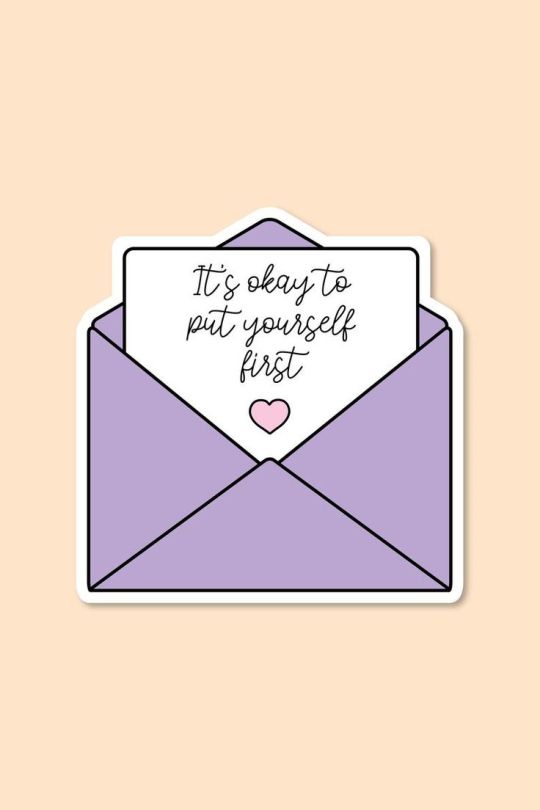
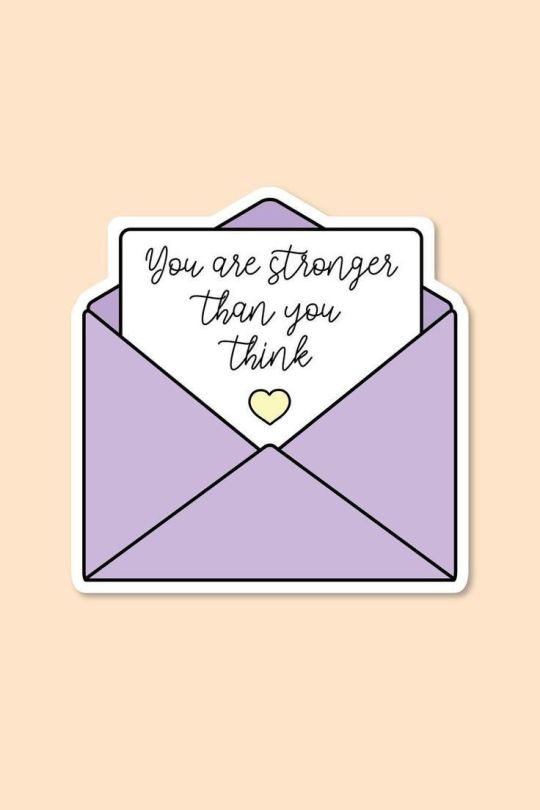
Group 1
Note from reader : As I was doing the last adjustments of your reading, I looked up at the sky through my window and looked at the clouds. That might be something the person we're talking about used to do a lot. In the shape of the clouds I saw many N and a few A. Those might be significant initials.
Letters : M F T I U A S N E M R S C V U Keywords : Mass, rain, Insta, star, rats, Cain, museum, amuse, Muse, cinema, mics, revue (French for magazine), fame, Reita, Sumire, saint, Cirus, Marcus, Mars, trains, Venus, arts, man, versus, Mantis, fumer (French for smoking), fast, cars, music, rants, Francis, frantic, France, matsuri (Japanese for festival), mister fun, musc, sister, fan, Ventura, Messi, faint, vain, veins, Traum (German for dream), stairs, Uranus, Saturn, Vermin, races, fire, Aries, Uranium, Taurus
Who is trying to reach out?
Creative soul | Unusual talent | Singer | Heterochromia | Earth angel | 5th house personal creativity I SERVE | 2 of pentacles, 7 of cups, page of swords, The Void, The Weaver, The Revolutionary
Okay I know this is going to sound crazy but I picked up on Moonbin. I can't explain why as I didn't know him very well. But I thought of him as soon as I wrote that channeled message you are gonna read in the next section. Aside from that, I can definitely tell that whoever is trying to reach out to you has passed on. This person was full of life and ideas, there were many things they wanted to say and do but they didn't get the chance to give life to all their dreams. They were young. Very young. This person wanted to fight the darkness and be a ray of hope in a world of doom. They had great ambitions and though they were battling their own demons, they truly believed in good and wanted to be good. They believed that they could weave their destiny as they wanted and that they could change the world if they tried real hard. They wanted to leave a positive impact around them. Heal the world. I'm also picking up on Michael Jackson energy. Maybe you or this person was a Michael Jackson fan. They may have been misunderstood by people around them when they were living. Maybe they were made fun of as a child because of their peculiar personality and talents. Maybe this person saw or did things that people didn't believe in or were afraid of. They were the first in their family to be like that. Maybe they were the first to be queer or the first that had a special talent that was deemed out of the ordinary. Could have been an artistic talent but also something related to the unseen. Maybe they could sense ghosts or they had downloads about specific events. They could have been the first to break from the family patterns and traditions. Like maybe in this person's family people were carpenters or automobile constructors from father to son and they chose to be an artist instead. I'm drawn to the snake on the Weaver card. Maybe snakes were important to this person. Like it is a symbol that represents them or this could be their chinese zodiac sign. Years of the snake are 1905, 1917, 1929, 1941, 1953, 1965, 1977, 1989, 2001 or 2013 and the next one will be 2025. But more than zodiac, I feel like they related to snakes in the sense that these animals are often feared and viewed as negative when they are neither good nor bad. They hold the potential for both and will only be "bad" if you threaten them. The reason I got drawn to the snake is because I know of an artist that passed on whose clothing brand logo was a snake. If any of you are familiar with The GazettE, I'm talking about Reita and his brand SNAKEDLOWS. Especially the one with the Ouroboros that was used in 2022. If you don't resonate with any of these artists, this could have been a family member, whether you knew them during their lifetime or not.
What they want to say to you :
"Dear love, I cannot stress enough how much I love you. You lit up my life in so many ways. I can never thank you enough for the support and love you have given me over the years. I owe so much to you. I was able to live a good life because of you. Please allow me to return the favor by being your n° 1 fan from now on <3 Fighting!"
Complementary info - The wildling, take risk, the pillar, connect to heart, The Void, 7 of pentacles, 7 of swords, page of cups rx, 3 of wands rx, King of pentacles
They are trapped in a state of limbo and they want to connect with you to be free. But they also want to help you set yourself free from patterns and obligations that you don't resonate with anymore. You are lying to yourself about the state you are in. You keep working and working without taking into account how you feel. Your life has become more of a routine and less of an adventure. You closed your heart to favor your mind. It's like you no longer marvel at life and try to run from your truth. They want to connect with you because they don't want you to do the same mistakes as them and ignore the signs that you are not okay. They want to help you ground yourself into an environment and a state of being that is healthy. Behind the Void hides Get curious. Behind the king of pentacles hides the knight of cups. They want you to be curious about love again. To open your heart again. To fight for your happiness because they don't want you to know the same fate as them. It's like they're saying "there are things I wish I knew sooner because if I'd known them maybe I wouldn't have had as hard of a time as I did". "If I'd known, I'd have told people how I felt. Maybe I would have been saved from my own sorrow. I don't want you to drown in your feelings like I did". There's a theme of mental health issues, suicidal tendencies and/or abuse from close circle like family members, friends. It's like this person in their life time chose to prioritize their job and the well being of others to the detriment of their own health and emotional security. They withheld information, pretended that they were fine when they were not. They hid behind their success and their career and most likely worked themselves until it was too much for them to handle.
Advice from your guides - 3 of swords, the world, The Pillar, Ask Body
Don't isolate yourself and remain in your anger or sadness. Speak up to somebody, reach out, open your heart to the world. There are other people who share your pain and doubts, who will be able to relate to what you go through and help you on your journey. Strengthen your body but also pay attention to the signs it is sending you. If you feel unusual pain, pay attention to it. Your third eye is opening. You are becoming more sensitive to spirit and other's emotions. So make sure you build strong enough walls to protect yourself from spiritual attacks. Ask your guides for help if you feel like you can't rely on anyone. Spend time in contemplation and prayer. The spirit of the cheetah is here to remind you that it's important to save your energy and only spend it for what matters. You need to find your center back instead of dispersing your energy in many projects at a time. "It is not unusual for the Cheetah Spirit Animal to come as a guide and support for people who have intense feelings. If you are empathetic, Cheetah reminds you it’s okay and healthy to cry. It releases all the excess input bumping around in your aura while cleansing and decreasing stress. Pause for a moment. Cry and then give yourself something wonderful afterward." You are asked to slow down and take time to let your emotions be expressed instead of repressing them. [Source : what is my spiritanimal]
───── ⋆⋅☆⋅⋆ ────────── ⋆⋅☆⋅⋆ ────────── ⋆⋅☆⋅⋆ ─────
Group 2
Letters : D R A A E T U E E O O Q A U E Keywords : tour, route, area, Qatar, road, dare, tear, deer, dear, rate, root, tora (Japanese for tiger), rat, door, eau (French for water)
Who is trying to reach out?
Cancer I FEEL July 20 to August 10 | Model | Heterochromia | Healer | Musician | Dorky/quirky | 7th house Awareness of others I CONNECT | 10 th house Outerworld I ACHIEVE | 8 of pentacles, 6 of cups, King of swords, Self love, The Void, The Seeker rx
I get two possibilities for this group. Some of you could have a passed on ancestor / parent trying to contact you. For others, this person is living but you are not in contact with them at the moment. In both cases, I get this feeling of communication being blocked. It's as if you refuse to be in contact with them or you delay the moments when you are in contact with them. No matter the situation, you are taking refuge in your work as a way to avoid them. This person could be a soulmate and/or someone from your childhood. I get the feeling of a dynamic between someone that is quite old and someone that is quite young. Like a clash of generations. This is just one example between many but think of a parent and their child or a mentor and their protégé. This person could have had a higher status than yours. Aside from the careers mentioned by the tissue box messages I also sense law enforcement, military, politics. Positions of authority in general. It's like you've created a bubble around you and you stay in that bubble. No matter how hard this person is trying to reach out, their attempts are cut short by the distance between you. It's like you voluntarily keep them at bay. I feel a lot of sadness and worry coming from them. It feels like they're afraid that they can't help you. They can sense that something is troubling you and they wish to help you in any way they can but you refuse their help. They feel lonely and left out. It saddens them to see that you don't seem to trust them as much as you used to. They understand and recognize your need for space and independance, your passion and goals, your personal legend. But they also wish that you would let them be a part of it, let them in into your world and give them the opportunity to contribute to it even just a little. More than anything they want to reconnect with you and go back to lighter and innocent moments, where you share memories and try to build a future together. This doesn't have to be a romantic thing. Actually I feel more of a parental vibe than a romantic one. But of course it's going to vary depending on people so for some it could be a romantic partner that is/was very protective of you and kind of acted as a parental figure.
What they want to say to you :
"My child, you need not to cry. Our fate isn't one to worry about. I cry for all of you who are here on Earth, who do not know the taste of true love. I cry for my brothers and sisters who still have to fight the same battles, though I've fought them before. I wish I could heal the world. I wish I could heal you too. <3"
Complementary info - Underworld, Seeker rx, Paradox, The Revolutionary, knight of pentacles, 3 of pentacles, knight of pentacles, Judgement
They wish that instead of giving a lot of attention to others you would allow yourself to receive help and attention from them. That you would stop keeping them at bay and let them show you a new perspective, a different way of doing things. That you would let them pave the way a little more for you and shed light onto other paths, other skills, other people that could be helpful. They want to find a common ground with you and create something stable, fruitful. They want to team up with you in order to restore balance in your life. If some of you are facing legal matters or have been wronged, they want to help you get retribution. They wish you wouldn't be so hard on yourself and stop fighting your battles alone. It's like they're saying "it doesn't have to be just you against the whole world, you don't even have to fight if you don't want to ; if you truly want it, let me stand by your side". For a lot of you this concerns your career or your studies. They wish that you would share your load with them. They wish that you would come to them for advice instead of trying to save them the worry because they're going to worry anyway so they might as well worry with you. They wish that you wouldn't be so harsh on them and judge them so harshly. You underestimate this person's ability to understand you. They wish to say "I've been there to and I know how you feel". They want to let you know that you are not alone, they fully support you in your decisions and choices. They're ready to fight for and with you. All they need is your command. They're saying "tell me what you need and I'll be getting it for you, tell me your fears and I'll send them away". Just one word from you and they will serve justice. There's also a theme about prayer, similarily to group 1. I heard "God is mighty and if you ask you shall receive". I know religion is a touchy subject so I don't want to force beliefs on anyone but if that is something you resonate with then they encourage you to keep going and turn to God for help.
Advice from your guides - Death, Versatility rx, page of cups, 4 of swords
They want you to take rest and do things that you enjoy. You may want to get your health checked. Put an end to connections and habits that are detrimental to you.
123 notes
·
View notes
Text
The merman scene is a literal masterpiece (I'm not joking)

I think it is what many scenes in this season are not: a perfect mixture of romance, comedy, and drama. It's silly but has a touching meaning. It makes you cry while laughing your ass off. It's simple but genuine.
The romance
How romantic it was! These are the blackbonnet we know and love. It was a confirmation of how even if Ed tries to supress it, his love for Stede is what keeps him alive, how he both lets Bonnet save himself and becomes better on his own.
Bringing someone back to life with your love is a trope that hits the jackpot in this show. It's corny, it's unbeliavable, and it's perfect. You ever love someone so much their voice pulls you out from the purgatory?
The shot of their clasped hands seals this scene, long, close. They hold each other, as they always did. You know, I'm kind of reminded of Ed's poem in 1x10:
Holding on...
By a thread...
Can't let go...
Except this time, Stede is back, and it's no longer a thread. It's a strong, confident grasp, an «I'm never gonna let you go again» hold.
Man, the only thing that was missing is a true love's kiss!
There might have been one, off-screen, when Ed reaches to kiss merman Stede...
The comedy
It was hillarious. Me and my friend were literally losing our minds while also trying to stay focused because of how overwhelming this scene was, how full of emotion.
And still, it's not funny in a way that undermines or defeats the scene's meaning; it's funny in a way that enhances it. Ed sees Stede as a merman hero with a giant trident — it's ridicilous! AND it's tooth-rotingly sweet.
The symbolism
As I said — simple, but geniune. Ed drowns, weight of his self-hatred pulling him deeper and deeper in the form of a stone. Then, he hears Stede's voice, how he begs for him to come back, how he loves him — and the rope that ties Ed to the rock loosens and sinks to the bottom of the ocean. His hatred dissapears because of his and Stede's mutual love.
The light that emits from Stede is both literal and metaphorical. He is in the light — in real life, hovered over Ed, whose eyes are closed. But he also IS the light — the good in Ed's life. The kindness, the generosity and the love Ed both receives and gives when he's with him.
Whoever wrote this scene must have been possesed by the ancestors of queer romance, because it was fantastic. Best scene in the season so far. With scenes like «you wear fine things well», it's not so easy to come up with moments that would be on par — but this one certainly keeps the bar high!
I love this scene so much, and I hope to see more like it in future episodes.

#ofmd#our flag means death#ofmd season 2#ofmd s2#ofmd s2 spoilers#ofmd spoilers#stede bonnet#edward teach#blackbeard#ofmd stede#ofmd blackbeard#blackbonnet#gentlebeard#ofmd ed#ofmd edward teach
239 notes
·
View notes
Text
Book recs: my favorite 2024 reads
I read over 160 books this year. Let's fucking go.
Note: List excludes re-reads and sequels, I am however not above including franchise novels and tie-ins.

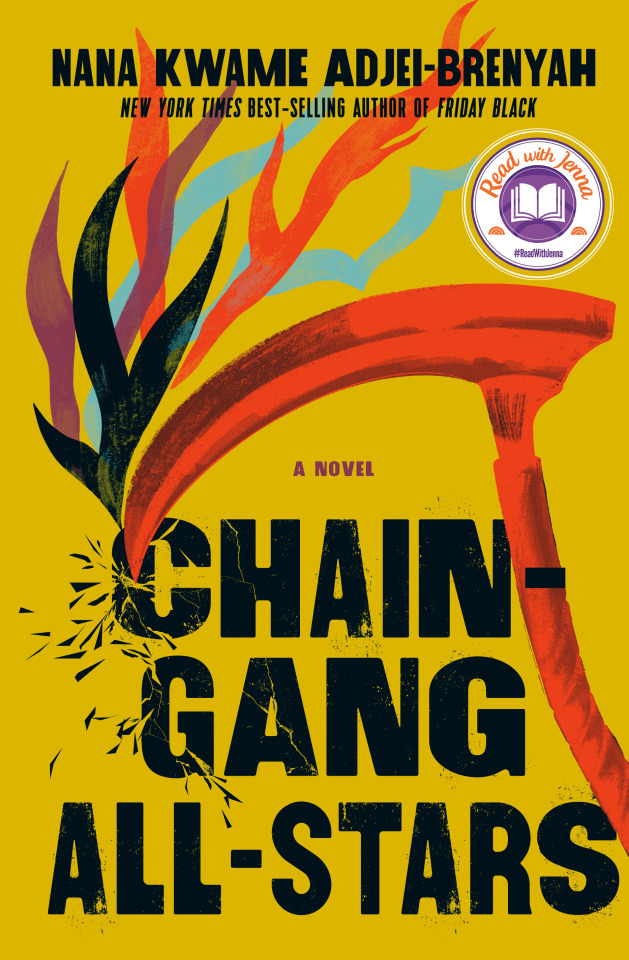
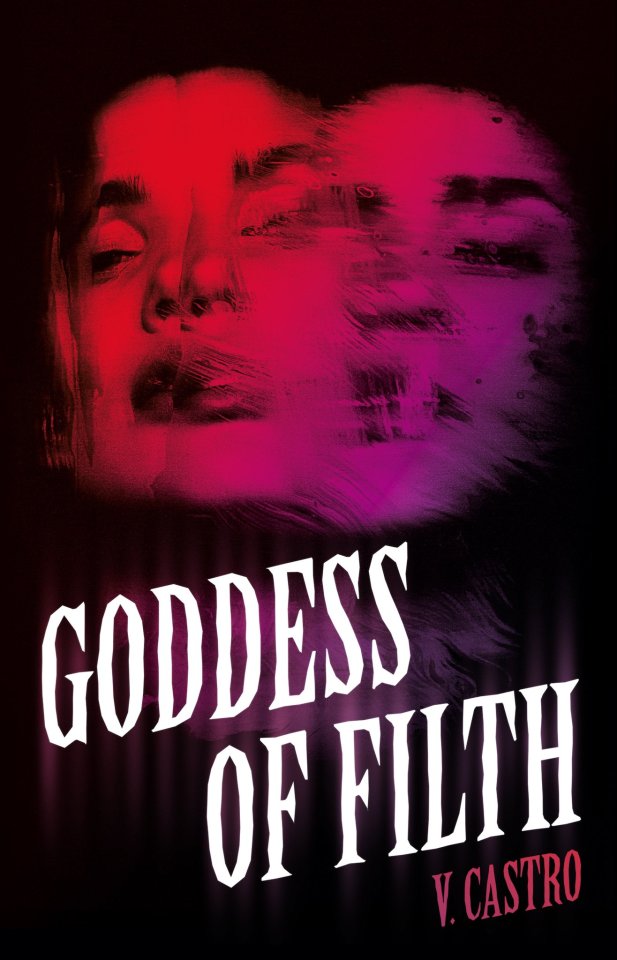
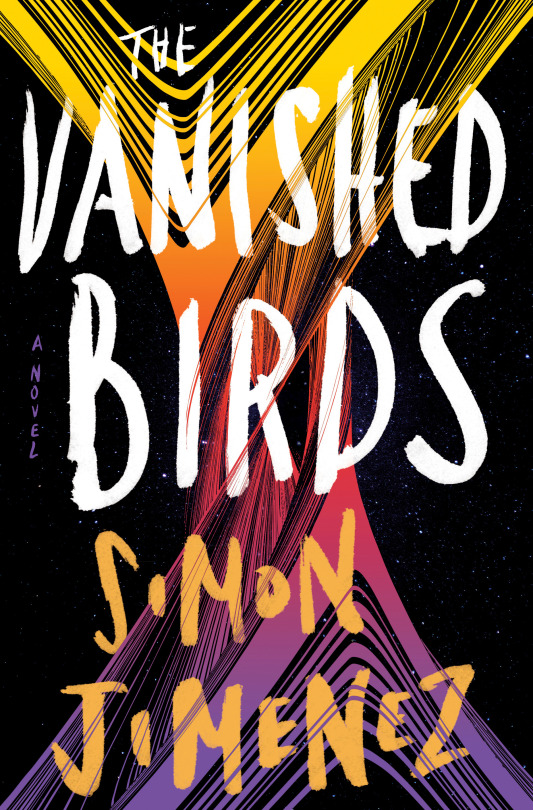
Chain-Gang All-Stars by Nana Kwame Adjei-Brenyah
Dystopia. In a near future America, inmates on death row or with life sentences can choose to participate in death matches for entertainment. If they survive long enough - a rare case indeed - they regain their freedom. Among these prisoners are Loretta Thurwar and Hamara "Hurricane Staxxx" Stacker, partners behind the scenes and close to the deadline of a possible release - if only they can survive for long enough. As the game continues to be stacked against them and protests mount outside, two women fight for love, freedom, and their own humanity. Chain-Gang All-Stars is bleak and unflinching as well as genuinely hopeful in its portrayal of a dark but all too real possible future.
Goddess of Filth by V. Castro
Horror novella. What starts as a drunken seance between friends ends with one of them chanting in Nahuatl, the language of their Aztec ancestors. Following that night, the formerly shy Fernanda has changed. While her family calls for priests, claiming her possessed by a demon, Fernanda’s friends believe what has taken up residence in her is something decidedly older. A quick read featuring female rage, desire and empowerment, this is a different twist on the typical possession story.
The Vanished Birds by Simon Jimenez
Science fiction. A strange child lands on an isolated planet, scaring its inhabitants into handing him over into the hands of Nia Amani. As captain of a transport ship, Nia is not only the planet's only contact with the outside world, she is also a woman out of time, years compressing into months as she travels through space at high speeds. Now responsible for a child who doesn't speak and in a galaxy that wishes them ill, she must rethink exactly what she wants to do with her life, and what she's prepared to give up. Features multiple major queer characters.
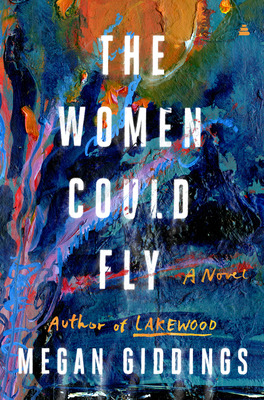
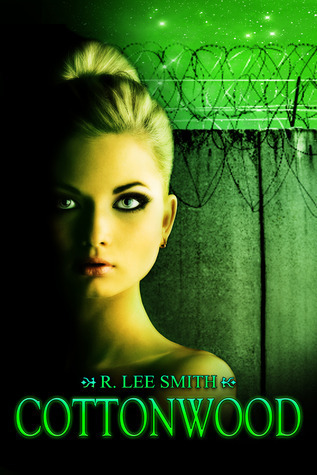
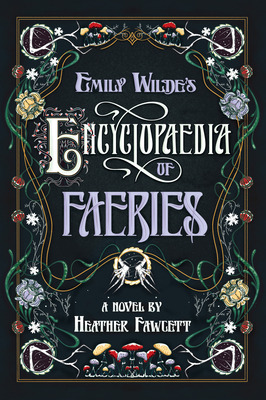
The Women Could Fly by Megan Giddings
In an alternate version of our present, the witch hunt never ended. Women are constantly watched and expected to marry young so their husbands can keep an eye on them. When she was fourteen, Josephine's mother disappeared, leveling suspicions at both mother and daughter of possible witchcraft. Now, nearly a decade and a half later, Jo, in trying to finally accept her missing mother as dead, decides to follow up on a set of seemingly nonsensical instructions left in her will. Features a bisexual lead!
Cottonwood by R. Lee Smith
Science fiction romance. 20 years ago, aliens arrived on Earth, neither invaders nor diplomats but refugees. Now they are being kept in integration camps away from the human population, meaning Sarah has never met one before getting a job as a social worker in one of the camps, at which point the true treatment of the aliens at once become horrifyingly clear to her. Sanford, single father, has a decades long plan to flee the prison that is Earth, and maybe with Sarah's help it can finally reach fruition. Includes dark elements such as torture, sexual assault, and pet death.
Emily Wilde's Encyclopaedia of Faeries by Heather Fawcett
Historical fantasy. Emily Wilde is a professor who prefers the company of faeries, dangerous but bound to rules she can understand, to that of humans, who she finds inexplicable. Working on her faerie encyclopedia, she travels on a research expedition to the faraway Hrafnsvik, hoping for some solitary months of study. Her hopes are dashed when Wendell Bambleby, rival scholar and possible faerie in hiding, arrives on her doorstep. But Wendell's aggravating presence is far from Emily's only problem, as the Hidden Folk of Hrafnsvik turns out to be far more dangerous than expected.
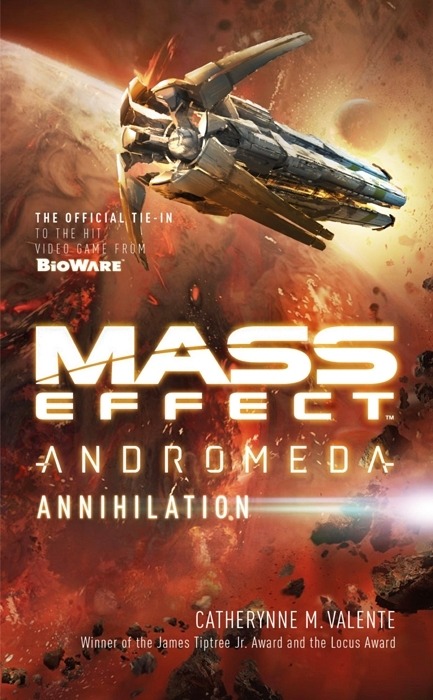
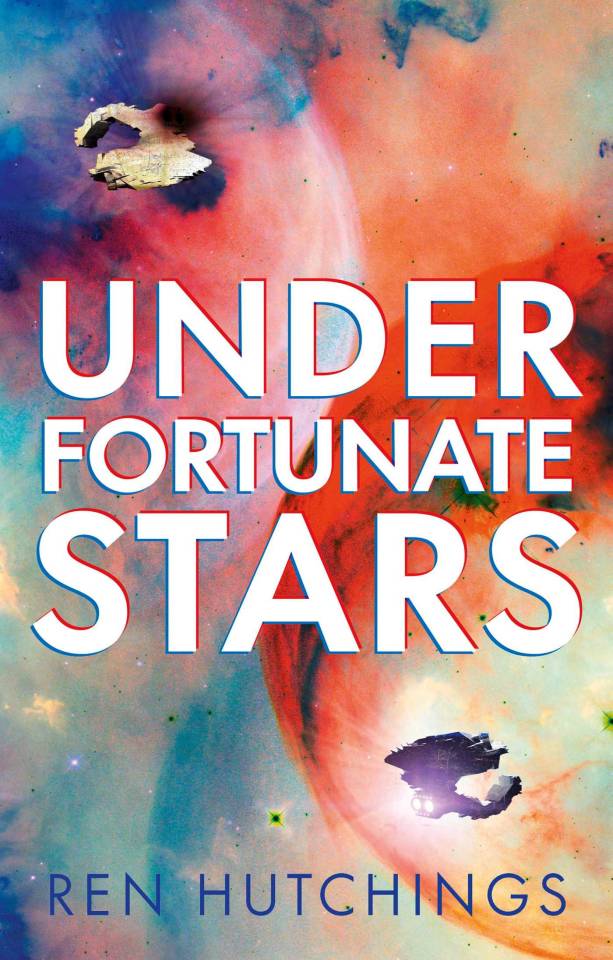
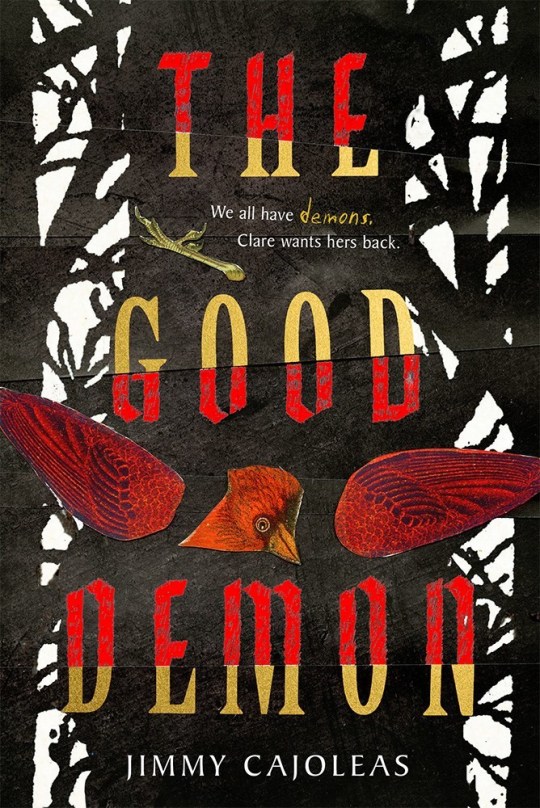
Mass Effect Andromeda: Annihilation by Catherynne M. Valente
In a ship carrying 20 000 colonists on a centuries long trip to the Andromeda galaxy, something has gone wrong. A small contingent of crew representing the various races on board has been woken up to find out why colonists are dying in their sleep, but the situation quickly gets worse. Soon a pathogen is spreading and jumping species, threatening the entire ship before it has even reached its goal. Tie-in novel for the Mass Effect games; while I love it a lot, you're unlikely to get the full experience unless you've also played the games.
Under Fortunate Stars by Ren Hutchings
Two ships have gotten stuck in a rift in space, isolated outside of time. One of them is the Jonah, a ship dodging a generations long war against an alien species, carrying a small crew of smugglers, an unintended passenger, and a hijacker. The other ship is the Gallion, which arrived from 150 years in the future carrying an alien ambassador - and whose crew is awestruck at meeting the heroes of the Jonah, known to have ended the war. As the two crews struggle to understand each other's timelines, they must also work together to leave the rift before they're stranded forever. Multiple queer characters, however the main romance plotlines are m/f.
The Good Demon by Jimmy Cajoleas
Young adult horror. Clare has recently been put through a successful exorcism, but rather than help her, it has left her miserable. Clare's demon was her closest friend and had been for years, and without her Clare is left alone and lost. Set on getting her friend back, Clare starts seeking clues her demon seems to have left her, and in doing so starts finding dark, old secrets buried in the history of her home town.
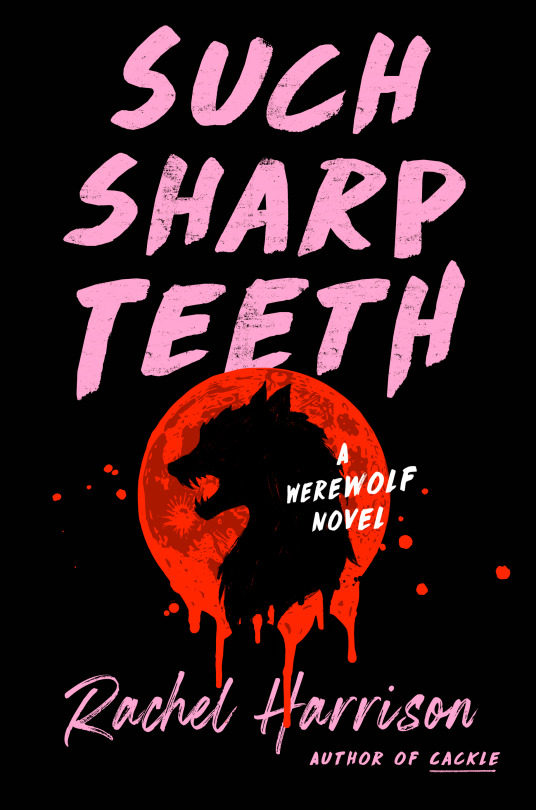
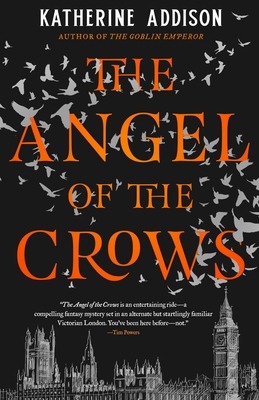
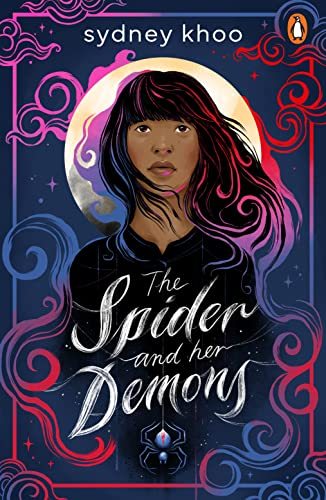
Such Sharp Teeth by Kim Harrison
When her pregnant twin sister is left by her boyfriend, Rory decides to go back to her home town and stay with her for a time. But the town is also the home of old childhood trauma, and something wild is roaming the woods. When she gets attacked and mauled one night, Rory's successful life is changed forever. Lycanthropy used as a metaphor for female rage, trauma, and bad coping mechanisms.
The Angel of the Crows by Katherine Addison
Sherlock Holmes retelling, historical fantasy. After having been injured fighting a war against fallen angels, Doyle returns to London to survive on only a veteran's pension. To afford a place to live in the city, Doyle finds a housemate in Crow, an eccentric angel with a great curiosity for humans and a knack for solving crime. And London needs its protector - supernatural beings walk the streets, and a someone going by the name Jack the Ripper terrifies the citizens at night.
The Spider and Her Demons by sydney khoo
Young adult fantasy. All teenager Zhi wants is a normal life (and possibly for her harsh aunt to be a bit nicer), but it’s hard when she’s half spider demon. Every day she must conceal her true nature and hide in human guise. When she slips up and eats a man in front of her rich, aloof classmate Dior, Zhi thinks her life is over. But Dior has secrets of her own, and she is dead set on making herself a part of Zhi's life.
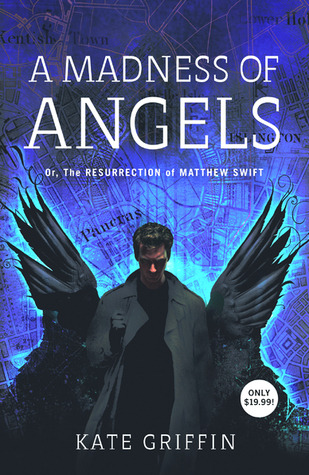
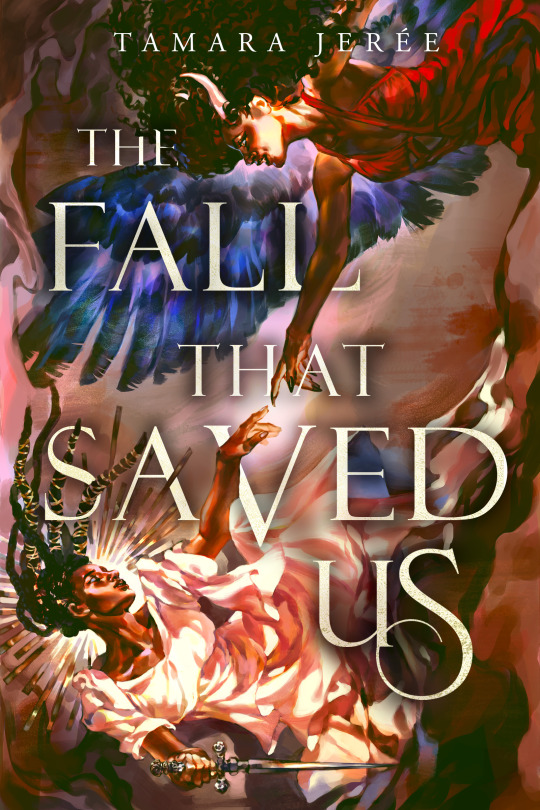
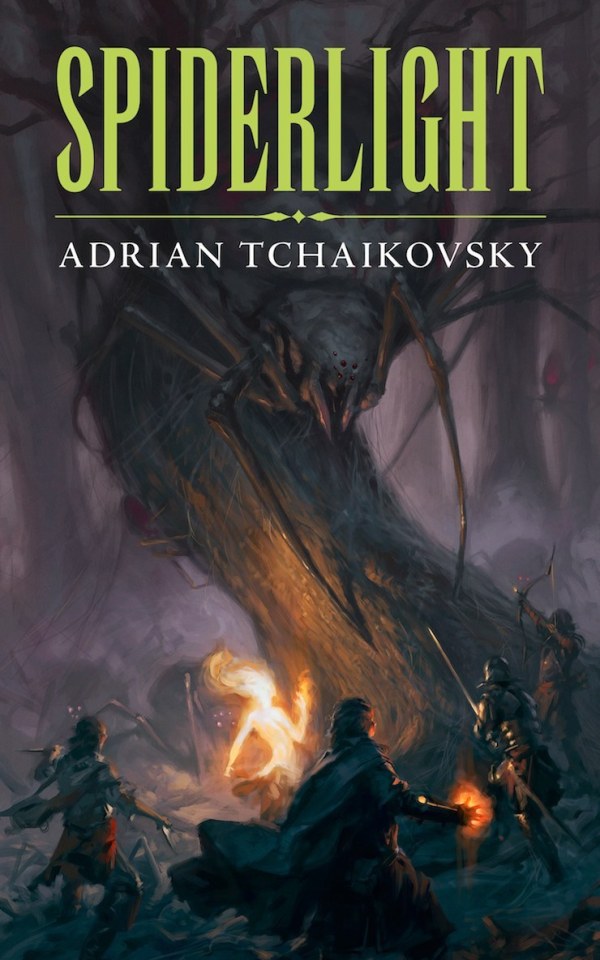
A Madness of Angels by Kate Griffin
Urban fantasy. Two years ago, sorcerer Matthew Swift was killed. Today, he woke back up. And he isn't alone in his body, but rather in the company of the blue electric angels, who lived in the telephone lines and are now experiencing the world for the first time through him. Now, he seeks vengeance not only against the one who killed him, but also against the one who brought him back. Absolutely buck wild unique take on switching and merging pov betwen singular and plural.
The Fall that Saved Us by Tamara Jerée
Sapphic romance. Cassiel is of angelic heritage, raised to fight and kill demons alongside her family. But Cassiel has left the hunt and her family behind, wanting a normal life. For three years she's built a life for herself, cut off from her family, but now a demon has found her, sent to collect her soul. Except, the demon isn't any more interested in following the orders of her family than Cassiel is. Can they work together to free themselves from the expectations placed on them?
Spiderlight by Adrian Tchaikovsky
Fantasy. A small band of heroes prophesied to defeat an evil king must follow the "spider's path"; to find the way they seek the aid of dangerous, man-eating giant spiders. As spiders don't keep maps, their mage turns one of the spiders into human guise, forcing it to lead their way if it is ever to return to its true form. Both dark and immensely funny, Spiderlight is at once a love letter to classical heroic fantasy quests and a deconstruction of the idea of 'evil races' in the fantasy genre.

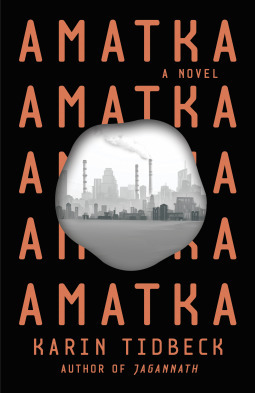
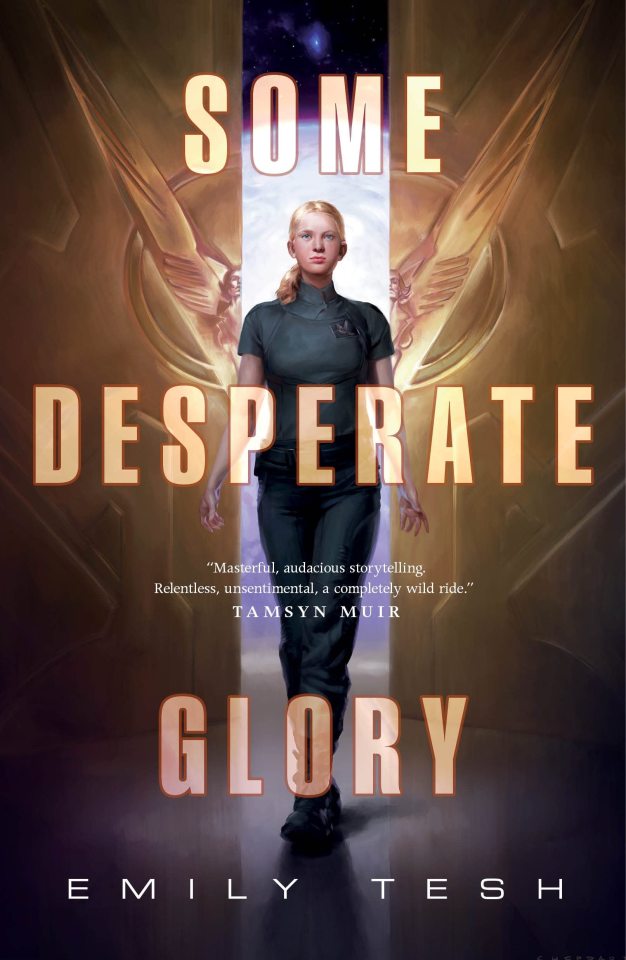
Providence Girls by Morgan Dante
Sapphic horror re-imagining of several of H.P. Lovecraft's works from the point of view of the women sidelined as victims in the originals. Forced to abandon her not-quite-human children to escape a cult seeking to sacrifice her, Lavinia nearly dies from exposure in the woods. She's saved by the prickly Asenath, and they find themselves growing close as Lavinia regains her strength. But Asenath's own dark past is catching up, as she too begins to transform into something not entirely human.
Amatka by Karin Tidbeck
Dystopia with especially creative world-building and a sapphic romance. In a vague past, something caused a group of humans to become trapped in an alien world, where the laws of reality themselves react in hostile ways to humanity's attempt at life and stability. To survive, strict rules and censorship are put in place, with harsh punishments for any overstep. Vanja is sent to the distant colony Amatka to do market research. In her research, she starts finding out the truth of the laws she chafes under, and begins to wonder whether life is really worth living if change isn't made.
Some Desperate Glory by Emily Tesh
Having grown up on the heavily militarized Gaea Station, Kyr has spent her whole life training to become a soldier, aiming to bring power back to humanity after Earth was destroyed in an alien war decades ago. But when she is relegated to the nursery to birth future sons and her brother is sent on a suicide mission, Kyr breaks the rules for the first time in her life. Breaking out an alien prisoner and working alongside her brother's asshole friend, she flees Gaea Station to save her brother and bring glory to humanity. But along the way she finds out there’s much she doesn't know, about Gaea station and her own family both.
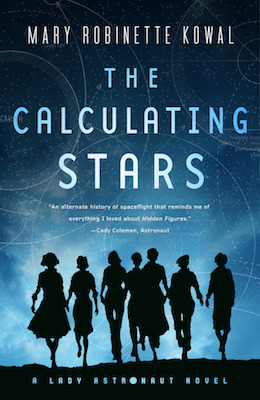
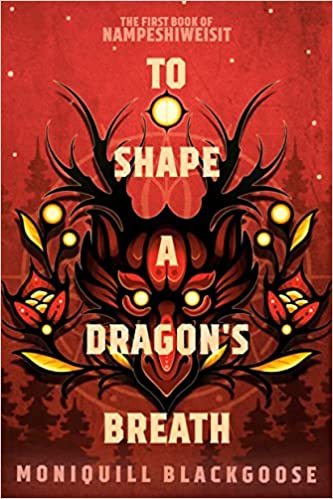
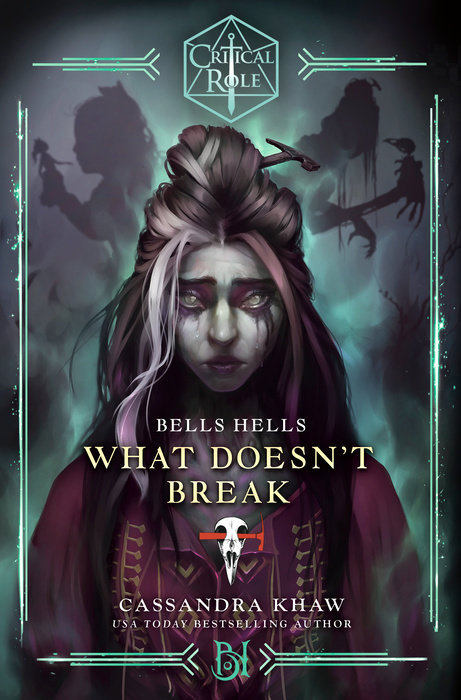
The Calculating Stars by Mary Robinette Kowal
Alternate history. In 1952, history changes when a massive meteorite hits the Earth, killing thousands and kickstarting a global climate change that will soon make the planet uninhabitable. To save humanity from extinction, the world begins to come together to bring us to space before it's too late. Elma York, WASP pilot in the war and expert mathematician, is hoping to become one of the astronauts, but finds that she and her women friends have to work harder than anyone else to be given room in the mission.
To Shape a Dragon's Breath by Moniquill Blackgoose
Young adult fantasy. Anequs is a young indigenous woman in a land ruled by Anglish conquerors. When Anequs finds a dragon egg and bonds with the hatchling, she is forced to travel away to attend an academy for dragon riders as one of only two indigenous students. Pulled between the traditions of her family and the ideas of the conquerors - many of which want her out of the academy no matter what - Anequs must find her place in the world as a dragon rider.
What Doesn’t Break by Cassandra Khaw
Fantasy, character study. You’re unlikely to get the full experience of What Doesn’t Break unless you’re also a viewer of Critical Role. It follows the backstory of Laudna, undead sorceress and warlock with the ghostly presence of the necromancer who once murdered her keeping residence in her mind and tugging at her strings. For thirty years, Laudna wanders the outskirts of society, forced into a lonely existence by her visibly undead status, and tries to understand what she wants to do with her un-life.
#nella talks books#chain gang all stars#goddess of filth#the vanished birds#the women could fly#cottonwood#emily wilde’s encyclopaedia of faeries#mass effect andromeda annihilation#under fortunate stars#the good demon#such sharp teeth#the angel of the crows#the spider and her demons#a madness of angels#the fall that saved us#spiderlight#providence girls#amatka#some desperate glory#the calculating stars#what doesnt break
17 notes
·
View notes
Text
How Did Lesbian Pulp Fiction Thrive in the 1950s and 60s?
Mark Harris, NYT Style Magazine, December 2024

THE COVERS ARE what draw you in first, just as they were designed to do. They promise sex but, more strikingly, they promise shock — the jolt of the taboo, the sinful. They’re illustrations of women, usually two, sometimes more, often half-dressed or undressing, in slips and bras, a strap provocatively sliding down the curve of a shoulder. A knee is raised as a nylon stocking is tugged off. They generally seem to show dusky rooms; if a window is visible, it’s curtained because what has been happening inside is not for decent eyes to witness.
The women might be lounging on a couch or, more daringly, on a bed with disarranged sheets. In those poses, they have much in common with their counterparts on the covers of any cheap paperback — a mystery, a thriller, a Southern saga — of the 1950s or early ’60s. Up to a point, that is. Because these women aren’t looking longingly at a man, or teasingly out toward a male reader. Their interest is only in one another. Often their expressions are hard, cool, ungiving or, if not, then lost, downcast, imprisoned in a secret sorrow. The dynamic playing out among them is almost unsustainably charged. And if the art doesn’t sell it, the cover slogan will: “The novel of a love society forbids”; “Theirs was the kind of love they dared not show the world. …”; “She Fought — She Struggled — She Even Married a Man! But in the End Ann Surrendered to Tortured Women Like Herself … !” As advertising, the covers couldn’t have been more effective. Seventy years ago, women saw them and bought those books by the millions. So did men.
In some ways, we’ve reached a moment in which those disreputable old novels, and the lonely, yearning culture that spawned them, are ripe for rediscovery. (Or more accurately, re-rediscovery: Some of the small lesbian and feminist publishers like Naiad Press, which first dusted off and reissued these books decades ago, are now themselves gone and in need of reclamation missions.) After being all but obliterated by the internet, queer-owned and -themed brick-and-mortar bookstores are starting to re-emerge, now accompanied by online versions. Bookstores bind us to literary history — at least, good ones do — and it feels like an apt time to revisit a not-so-distant past in which it was an act of risk and daring (not to mention of sheer hunger) for a woman who loved women to walk into a shop and purchase a story meant to speak to her or about her. And in a yesterday’s trash is today’s treasure arc that speaks to how many elements of gay pop culture history evolve from degraded discards to camp objets to worthy subjects of academic study (see also: “The Golden Girls”; Tom of Finland), collections of the novels have now found their way into various gay and lesbian archives and even into the Smithsonian Institution.
But exploring the lesbian pulp genre requires suspending any sentimental preconceptions about one’s ancestors. It arrived on the scene before gay pride, whether with a capital “P” or a lowercase one, was a notion; before the existence of “L.G.B.T.,” or of the unity of purpose that those jammed-together letters now purport to represent; before anything like a national gay rights movement had started to take shape. Whenever a piece of antique queer pop culture is unearthed, especially if it’s from the pre-Stonewall era, we tend to try to fit it into one of two categories. Either it’s problematic, a relic replete with attitudes and stereotypes of which we disapprove that can only be understood as regrettable elements of a less enlightened time, or it’s pioneering, a daring, prescient and hitherto unappreciated leap toward a future that nobody back then could have predicted was on the near horizon. Yet the phenomenon of the lesbian pulp paperback — and it was a phenomenon, both culturally and financially — resists any such attempts at pigeonholing. It was both problematic and pioneering, although neither word adequately describes something that was at once a cynical business proposition and a burgeoning art form, a reinforcer of negative stereotypes and an act of breathtaking liberatory outreach, one that connected with countless women who had nowhere else to go, either in art or in life, if they longed to discover stories about people even remotely like themselves. Was lesbian pulp good for the gays or bad for the gays? The only accurate answer is yes.
It was also, even within the then-rarefied context of queer pop culture, an exception to the rule: In a history that has so often marginalized or minimized lesbian tastes, interests and contributions, here was a vibrant category of popular art centered entirely on female desire. In the very limited public discourse about homosexuality in the early 1950s (and for a long time after that), it was gay men who were in the spotlight, reviled as a menace, a grotesquerie, a threat to national security, to the safety of parks and neighborhoods and schools and children. Lesbians, in that discussion, were often an afterthought … if they were thought of at all. Though the threat to their safety and employment during the so-called Lavender Scare of the early 1950s was very real, they weren’t so much the target of male revulsion as of disappointment, indifference and unspoken erotic curiosity; women who preferred women were viewed less as public threats than as damaged goods, scarcely worth considering.

So it’s all the more remarkable that in the realm of American publishing, lesbian fiction became a booming enterprise at a time when its gay male counterpart could scarcely find a toehold. Part of the reason was a built-in difference in tastes — the women who purchased and read lesbian pulp wanted narratives, which those paperbacks could provide; gay men wanted erotica, nudity and porn, which, at a time governed by a web of postal, state and local anti-obscenity laws, wasn’t an over-the-counter option.
But lesbian pulp fiction also thrived because, through more than 500 paperback novels in the category’s roughly decade-plus run (it emerged in 1950 and was all but gone by 1965), it evolved from shame to something approaching self-determination. The genre may have been invented largely by publishers and marketers who knew how to make sure that the books were insulated from prosecutorial eyes by locating the gray zone in which prurience met disapproval. But as the genre developed, its path was shaped by its writers — many of them (but not all) lesbians, almost all writing pseudonymously — who found ways to tell stories that eventually stopped being primarily about punishment and started focusing on possibilities.
THE NOVEL THAT launched the genre was, strangely, an anomaly — a book written by a straight married Frenchwoman who was encouraged by her husband, the novelist Meyer Levin, to write about her experience serving in the Free French forces during the Second World War. When Tereska Torrès’s “Women’s Barracks” was published by Fawcett in 1950, paperback originals, let alone lesbian pulp, barely existed as a category; Fawcett had just launched its Gold Medal label to see if readers might be willing to pay 30 or 35 cents for something other than reprints of hardcover best sellers. They were: “Women’s Barracks” sold 200,000 copies in a blink. Five years later, it had sold two million. The cover helped; the illustration of a woman in nothing but underwear and a bra changing in front of other ladies, some scantily dressed and one smoking a cigarette and clearly giving her a good, hard once-over, was so provocative that it helped spur the creation of an anti-porn congressional committee composed of members who thought that kind of art might drive men to rape.
Torrès wasn’t especially interested in telling a story about or for men. She wrote the novel in the voice of a young recruit who joins an all-female volunteer auxiliary in World War II and experiences several different kinds of awakening, starting with the medical entrance exam in which she notices that a young woman near her is “seemingly quite at ease in her nudity.” Soon enough, one of the volunteers, Ursula, is being seduced by a brassy, glamorous older woman named Claude who is unhappily married (“He drinks too much, and he’s a fairy, damn him!”) but alive to both new opportunities and easy prey. As Ursula is undressed by Claude, “her heart beat violently, but she didn’t feel afraid. She didn’t understand what was happening to her. Claude was not a man; then what was she doing to her? What strange movements! What could they mean?” Once the clothes come off, you can almost hear the music swell; Ursula starts to feel that “all at once, her insignificant and monotonous life [has] become full, rich and marvelous.”
The sex scenes in “Women’s Barracks,” and in the first wave of lesbian pulp that followed its success, don’t get particularly explicit; although there’s some gentle cupping of breasts and ecstatic arching of backs, nothing that unfolds couldn’t be quoted in The Times. But in 1950 — an era in which the Motion Picture Production Code, the set of de facto censorship rules by which studios regulated the content of their movies, forbade even a mention or textual implication of homosexuality in Hollywood movies — any such passages were revelatory, not to mention hot. What they were not was what we’d now call positive representation. For gay people, neither the term nor the concept existed at the dawn of the genre, which came five full years before the formation in San Francisco of the first lesbian rights group in the United States, Daughters of Bilitis. The tropes in the first wave of lesbian pulp were often fairly grim: An intense, cynical, somewhat predatory older woman — a career lesbian, if you will — would enter the world of someone younger and confused, whose experience of men had been either limited or abusive, and they would begin an affair. It would eventually founder, often because, for one woman, lesbianism would prove to be just a side trip on the way to happy heterosexuality, but equally often because of the manipulation or neediness or instability of the “real” lesbian, who, in the most extreme narratives, would end up dead, suicidal or institutionalized.
This wasn’t just a storytelling preference but a necessity. When the lesbian writer Marijane Meaker, jumping off the success of “Women’s Barracks,” proposed “Spring Fire,” the novel that really got the genre rolling, in 1952, she wanted to set the story in a girls’ boarding school. Her (male) editor told her to age the characters up to college, and added, “Make sure these girls turn away from homosexuality because it is immoral — don’t just have them talk about it being a hard life. We have to pass postal inspection.” Meaker, then in her early 20s, closeted and dating men, would soon become a lover of the writer Patricia Highsmith’s, and a giant of the genre. She wrote under at least five names. The gender-ambiguous Vin Packer, the kind of sturdy-sounding moniker that might help to attract male readers, was her nom de plume for lesbian pulp.

“Spring Fire,” which sold 1.5 million copies, is a campus romance between a 17-year-old athletic Midwesterner, Susan Mitchell (“Most folks call me Mitch”), and her older roommate, Leda Taylor. Their connection must be secret (“It’s ours, Mitch. Keep it ours and never tell it”), but it’s real and heartfelt: “She was not separate from Leda, but individual and one. She was wanted and she wanted, and it was not a want striped with fear and hurt.” Their affair sends Mitch racing to the school library, where a scary volume informs her that “the female homosexual, the lesbian, often preys on girls who are not true homosexuals. Such girls may enjoy men, and be capable of normal heterosexual life if they do not become involved with a genuine lesbian type, whose technique is often more skillful than that of many of her young men suitors.” Their love is doomed; they’re caught in the act by other girls and, at the conclusion of the novel, in the literary equivalent of an ending mandated by Hollywood censors, Mitch moves on after Leda crashes her car and is hospitalized with a nervous breakdown. “As Mitch walked … she thought of Leda — hazily, as though she were someone she had known a long, long time ago. … She didn’t hate her at all, and she knew then that she had never really loved her.” Roll credits.
THESE BOOKS WERE, over the next decade, published at a staggering rate. Sometimes, as was the case with Highsmith’s pseudonymous 1952 lesbian romance, “The Price of Salt” (the basis for the 2015 movie “Carol”), a hardcover literary novel published by a mainstream house would be repackaged a year later as a pulp paperback. But the vast majority of the books were paperback originals. Some writers could churn out a completed manuscript in 10 to 14 days. Several of them were men — both Lesley Evans, the author of “Strange Are the Ways of Love” (1959), and Jill Emerson, who wrote “Warm and Willing” (1964), were actually the crime novelist Lawrence Block.
The novels had to be presented carefully; even in the largest American cities, gay bookstores didn’t yet exist, so the covers, the titles and the stories all had to meet standards that would allow them to be credibly intermingled with run-of-the-mill paperbacks in a mainstream bookshop, or in a stationery store or pharmacy stocked by someone who was either sympathetic, opportunistic or both. Code words quickly developed. Since terms like “lesbian” and “homosexual” couldn’t then appear on covers without embarrassing potential purchasers and possibly risking police attention, readers learned to look for certain cues in the slogans — “frank” and “shocking” were both good indicators — or words in the title that assumed fluency in a shared but unacknowledged language. “Whisper” became a reliable signifier of what, and who, resided in those pages, as did any reference to “strange” or “twilight” love.
While the creation of the books proceeded with something approaching factory efficiency, it was not free of conflict. Some lesbian authors, though they were powerless to change their publishers’ minds, constantly pushed back against the come-on art that sold the books. And by the late 1950s, a semiprivate argument about the novels was blazing through the pages of the monthly, discreetly distributed Daughters of Bilitis newsletter The Ladder, whose correspondents frequently complained about what they saw as hostile and unflattering stereotypes in the books.
Because almost all of the genre’s writers used pseudonyms and because of the vagaries of book distribution, it was hard for individual writers to develop a fan base, and equally hard for readers to know who they were reading. A sensitive novel by a lesbian writer who was trying to move pulp an inch or two forward might reside on the rack next to a lubricious sex fantasy written by a man who’d never even met a lesbian. The cover art for each might blur the distinction so completely that readers had little idea what they were getting; it wasn’t as if the novels were reviewed anywhere or even acknowledged in the press, except as a symptom of a grave social ill.
Nobody was doing demographic studies of readers, let alone of queer ones, in the 1950s, but the mail that the authors received made it clear that young lesbians were devouring the books, including some who, inspired by what they read, would shortly become writers themselves and reshape the genre with their work. “Readers tended to enjoy them furtively,” the author Ann Weldy explains in a 2001 introduction to a reissue of one of her novels. “It took guts just to buy those books and confront the smirk on the face of the clerk at the cash register. People tried to disguise them in a pile of sundries they probably didn’t even need, but bought anyway to distract attention from those eye-popping covers. I know — I was buying them, too.” Weldy was in her early 20s when she read Meaker’s 1955 “We Walk Alone” (credited to Ann Aldrich), a nonfiction account of lesbianism that, to her, offered the value of “a veritable Michelin Guide.” She says in the introduction, “ Aldrich told you what it was like to come out (joyful prospect!). She told you where lesbians in the know gathered … what these women wore, how they talked, how they coped. … You were amazed to discover that there were different lifestyles within the nascent lesbian community: high and low, butch and femme, uptown and low-down. … The effect on women was electric.”

Within a couple of years, Weldy, as A. Bannon (later Ann Bannon), would write “Odd Girl Out,” the first of a series of six novels about a brash, confident young butch lesbian and her circle of friends that are now known as “The Beebo Brinker Chronicles”; they were published between 1957 and 1962 and revolutionized the category, in which butches had previously been treated mostly as villainous or embarrassing. The books were still required to provide a quota of mental collapses, acts of self-destructiveness, bitterly regretful women and sham marriages. (Weldy herself had a husband and could only occasionally get away for research in New York’s Greenwich Village.) But somehow, she made room for at least a couple of characters to come to terms with their lesbianism and, crucially, survive the last page and be developed further in subsequent novels. The “Beebo Brinker” books constituted the first successful lesbian series in genre fiction. But even more significantly, they were the first novels to suggest to lesbian readers across the country the possibility of finding community in a city where, no matter what type you were, you could meet others who were like you. As they did with Meaker’s books, Weldy’s audience wrote in by the hundreds, describing what they enjoyed reading and what they didn’t, asking for more, bursting with questions, pleading for advice.
Other writers quickly joined in; the novels got bolder and, by millimeters, more hopeful. In the early 1960s, the titles could be blunter — “Counterfeit Lesbian,” “Flying Lesbian,” “I Prefer Girls” — and the cover slogans (the one for “I Am a Lesbian” reads “Her kind of love was different — but was it wrong?”) hinted at the possibility of a conversation rather than a rush to judgment. The genre’s low-end books, which proliferated in a now slightly more legally permissive climate, got raunchier; the cover of the unfortunately titled “Dance-Hall Dyke” (1964), set in “the vicious jungle of lesbian lures,” shows a steely lesbian grabbing the butt of a half-dressed redhead.
ONE MIGHT IMAGINE that, in a decade of increased activism leading toward the Stonewall uprising in the summer of 1969, lesbian pulp would have continued to progress in both candor and popularity, with ever more forthright assertions of identity and of a chance of living happily. Instead it dwindled and, quite quickly, died. In part, the books were a victim of changing mores in both publishing and reader tastes. The arrival of Mary McCarthy’s blockbuster “The Group” in 1963 meant that a novel with a central lesbian character could be argued about in Time and Newsweek and at book-club luncheons; nobody who wanted to read it or early ’60s lesbian-focused literary novels like Jane Rule’s “Desert of the Heart” or May Sarton’s “Mrs. Stevens Hears the Mermaids Singing” had to worry about dodging the disapproving glance of a cashier. And although, under a now somewhat relaxed Production Code, some of the first overt depictions of lesbians in Hollywood movies like “The Children’s Hour” (1961) and “Walk on the Wild Side” (1962) were either tragic or savage, once stars like Shirley MacLaine and Barbara Stanwyck could play lesbians, cheap novels no longer claimed a monopoly on the thrill of the forbidden unless they resorted to sexual explicitness — which isn’t, it turned out, what their core audience wanted. Publishers walked away from the genre as abruptly as they had stumbled upon it. (Gay male pulp, which was less romantic and ranged from campy spoofs to outdoor adventures to 19th-century enslavement fantasies and moved rapidly toward hard-core sex, only started to emerge in the mid-60s and was done by the early ’70s, when actual porn obliterated the need to go to the trouble of reading.)
Lesbian pulp novels went into eclipse for a while, but they aren’t lost — they never have been. The first surge of appreciative reprints and reassessments came in the 1980s; another followed in the early 2000s, this time from independent presses. Still, to encounter the books now, especially in high-quality editions uncoupled from any suggestive cover art, can be disorienting. The texts represent not so much an earlier point on the gay liberation timeline as one at which such a timeline had not yet been imagined. Lesbians and gay men had barely considered making common cause — if they could identify the cause at all. And many of those who would have most benefited from greater civil rights, including those who were unknowingly paving the way for them with their work, had profoundly mixed feelings about their own place in the world. How could they not, in a society that discussed them only as criminals, deviants and mental cases? In one of her early novels, Meaker sneers at “organized queers … with their earrings and their dyed hair and their ‘Darlings!’” And Yvonne MacManus, the author of the popular 1959 pulp novel “Edge of Twilight” (one of several she wrote as Paula Christian) about the relationship between two air hostesses, one a lesbian and one not sure, explored her own uncertainties with evident distress in a 1961 essay in The Ladder. “I confess I am not a dedicated lesbian … ,” she wrote, “nor one who wishes to make the world safe for the next generation of homosexuals. I would prefer it if psychiatry could learn enough about the subject to help those of us who do not believe homosexuality is the best of all possible worlds.”
It’s startling and saddening to see those words now, especially from a novelist whose characters were among the first in lesbian pulp to own their desires and identities. “Don’t say ‘queers,’” Toni tells her lover Val in “Edge of Twilight.” “It’s offensive. We’re ‘gay,’ or lesbians or homosexuals, and sometimes ‘twilight people,’ but not ‘queers’!” MacManus lived until 2002, long enough to see the reclamation of even that word. And her work, and that of her colleagues, lives on today — written by women whose every step, no matter how tentative, took them deeper into the unknown.
#lgbtqia#lgbtq history#lesbian#lesbian history#queer history#lesbian pulp#history#literary history#we have always existed
9 notes
·
View notes
Text
Samhain, Ancestors and Strange Occurrences (storytime)
A personal story time ahead of something that happened just the day before Samhain/ Halloween with a friend.
For context, I do not work with ancestors due to the sheer lack of connection, being queer, trans and in general not having good ancestors who I think can add much to my life (where at a point I ended up throwing their candle in their trash - yeah, i know - but that is a story for another time. If you have absolutely hateful and horrible ancestors that you have had altercations with, you Know).
I was on a call with my friend, who is also a witch when I told her that I kept hearing sniffling at my back, even though there was nobody there, I could feel a strong presence.
She simply asked me to throw some salt over my shoulder (a typical witch remedy, of course), and I said, "Maybe, or it could just be the veil thinning since Samhain is arriving in less than a day."
And at the same time we both ended up saying,
"it feels like an old man"
"maybe an old man ancestor who is proud of you"
Both of us paused and looked at each other as - okay if we are both saying that something is going on. She immediately stopped everything, got in the zone to channel and started describing this old man to me, and lo and behold, she was literally describing my great-grandfather.
I had never spoken to her about him, nor did she know of my relation with my great-grandfather. Yet, she got the specifics of the type of glasses he wore the exact type of cane, his favourite food, his favourite flavours, objects he carried around with himself, and specific things he had said to me.
Safe to say, we both were shocked, and she kept saying I don't know how this is happening, and how it is never this specific.
There was a lot more shared that I will not be sharing here for very obvious reasons.
Turns out that even if you put your back on your ancestors, they are still very much there, something which, if I had read in the past, I would have scoffed and moved on, and that is the power of personal experience.
(Reminder -This is not me saying that you too will have this moment, nor is this me trying to say that yes working with your ancestors is something you need to or should do. Hell had not even dabbled into the idea of working with them for 5 years until I did, which did not go well. This is a personal experience, sharing about my interactions and experience. You do not have to ever work with an ancestor, regardless of whether them reaching out or not. It is your practice and you get to choose what remains a part of it and what does not)
In my head, he would have been the last person I would ever expect to reach out to, yet he is the one who has been there, looking after me, present, only wanting for me to talk to him and share things with him like old times.
Here is to the veil thinning, and the ancestral energy of Samhain which I had always hated. There is now something to look forward to.
Things can change even after 8 years of being in this practice. And this is why I love being a witch with all my heart.
Happy witching and Merry Samhain to you and your loved ones.
#samhain#samhain season#wheel of the year#witchblr#witchcraft#halloween#all hallows eve#spooky season#ancestor veneration#ancestors#ancestor work#spirit work#divination#channeling#story time#spiritual practice#merry samhain#happy halloween#i love samhain with my heart even more now#happy witching folks#witch community
11 notes
·
View notes
Text

We're on a roll of not waiting until 10:00 pm to make this post, woo! This week's rune is Ingwaz. This rune is one that I associate with life cycles: it is a mound in the earth, whether it be a funeral mound or a a place with a new seed has been planted. (Sometimes both!) What is standing out to me today, though, is the relation to funeral mounds. The practice of sitting on grave mounds, or Utiseta, is an Old Norse tradition in which a seer would sit over a burial mound to gain wisdom from the ancestors buried there. Here in the Northern hemisphere, we're starting our inward spiral as fall rounds the corner and our days become shorter and shorter. The veil is growing ever thinner as we approach Samhain. Whether or not you are able to literally sit on someone's burial site, this rune is indicative of a need to connect with ancestors as we begin this inward spiral of introspection and contemplation as the dark seasons approach.
This does not have to be a biological ancestor. It could be an ancestor of order (one of your shared faith path) or of community (like if you are LGBT+ reaching out to the queer dead, for example). It could even been chosen family or close friends that have passed on to the next life. As you go through the week, take some time to contemplate the influence of an ancestor (or ancestors) on your life. How did they make your life better? Or worse? What did their life on this side of the veil teach you? The result of this meditation might be the key to your shadow work during the dark season this year. It may not be The Work, exactly, but rather a stepping stone to get you to find what that work really is. It's at the other end of this shadow work that the seeds of growth get planted for the next light season. It could also lead you to find an ancestor that is raring to help you in doing this season's shadow work. Keep yourself open to these various possibilities.
If you are in the Southern hemisphere, this rune indicates to me that now is a good time to reflect on the progress you've made from the shadow work done in the dark season that is now behind you, and to start shifting your focus to growing the seed that that work has planted. Remember how the ancestors helped guide you to this place, and remember the ancestors of the future that your seed will help foster. Like us here in the North, there might be an ancestor reaching out to help you as you fertilize this new seed and watch it grow.
Also worth noting: Ingwaz is associated with Frey (Ingvi-Freyr). In addition to everything above, if Frey has been calling to you (or is even already a part of your practice), now might be a particularly great time to connect with him, especially in relation to your seasonal work!
#weekly rune pulls#rune reading#rune readings#runes#elder futhark#divination#heathen#heathenry#lokean#norse paganism#uu pagan#frey#ingvi-freyr#freyr#shadow work#seasons#ancestors#ancestor veneration#ancestor work#pagan#paganism
18 notes
·
View notes
Text
goyische friends & allies i'm really gonna need y'all to step the fuck up for jewish people. as a native jew over the last, like, three-four days & the year prior, i've seen really antisemitic things be thrown around on all platforms & it's absolutely unacceptable, and I'm gonna be brutally honest here but most of the time the shit I saw wasn't even coming from right wing antisemites but people who claim to be progressive leftists. people with pronouns in their bio. people who claim to be inclusive of everyone but remain silent. i'm tired of seeing my friends in the community be scared. as a native jew, my fight for palestinian liberation comes from not only because it's the right thing to do when people are suffering but also because i see myself & my native ancestors & what they went through in palestinians, i was the only person in my very secluded rural area to raise awareness of the issue while also condemning antisemitism & islamophobia. but as a native jew, whenever i talk about native issues & my own experiences, you have to support me & others when i talk about jewish issues & experiences, too. there's always been an antisemitism problem in leftist spaces but the shit i've seen in the last year is horrific.
the jewish community has always fought for other movements like pride (y'all literally wouldn't have the pride parade without the mother of pride who was a kinky polyamorous queer bisexual jewish sex worker), racial liberation movements, workers' rights, etc., but most goyische leftists from what i've seen consistently refuse to do the same for the jewish community. you can't have it both ways. you can't claim to care about everyone's issues & be antiracist & then either throw around antisemitic dogwhistles intentionally or not & turn around & not or be as silent as crickets when jewish people are telling you that people are grieving & they need support & help. that's not how it works. i'm gonna be brutally honest but your activism is performative & meaningless if it doesn't include ALL marginalized communities. you can fight for more than one community & cause at the same time. it's really not that hard, i do it all the time. liberation is for EVERYONE. a core concept of indigenous liberation & values & from what i've always been taught by my elders is the people & that no one group is better than the other & that caring for others & the land was important. very few goyim have reached out to ask me if i was okay when it came to jewish issues & most of the support i received came from other jews & my jewish palestinian friend. i can count on one hand just how many nonpalestinian goyische people came forward. guys we HAVE to do better than this y'all.
12 notes
·
View notes
Text
"...and I'm the one who loves you"
Kinnporsche vs Call Me By Your Name meta

I was thinking maybe I should write this meta. After all, if I compared Mile’s fave LGBTQ film to KPTS, shouldn’t I do the same for Apo’s? Seems only fair. But honestly, CMBYN is so intensely personal for me, since I'm both gay and Jewish, that I wasn’t convinced I can do it. Then back in June, Mileapo chose to fly to Paris while wearing each other’s fave color, so here we are.
“We may be Jews of discretion”
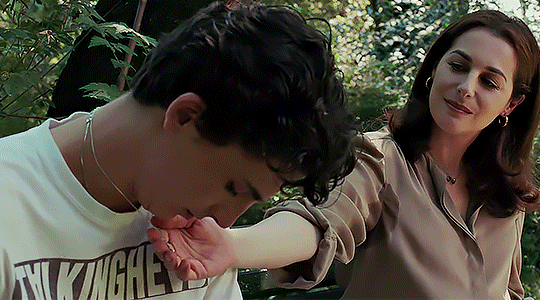
The reason why CMBYN is so personal to me is not just that its protagonist is queer and also happens to be Jewish. It’s that the similarities are pointed out between being a member of both of these marginalized groups. Not for every single member of these groups, of course, but many times if you’re Jewish or if you’re queer, it is possible to hide. Not if you’re a religious Jew, with clothes and customs that give you away. Not if you’re a guy whose manners are seen as “sissy” and homophobes decide you’re gay before you even identify as such. Not if you’re a Jew with a very obvious Jewish last name or ethnic look. Not if you’re a queer person who happens to fit someone’s idea of what gay people are like. But under certain circumstances, there is a possibility to hide, to be invisible. And that existence isn’t easy either, when an antisemitic or homophobic environment can make it sometimes feel impossible to do anything other than hide, feeling like a target even when you do. You have to force yourself to act a certain gender-conforming way, or hide your Star of David necklace, relinquish some of the things that you want and need, or only get to have them in secret. You just have to be silent. Keep your voice as a member of one of these groups to yourself. Keep your authentic self unseen. Know that otherwise, there will be much to lose. That you can never be sure of your safety. Hide. Remain disconnected from your community. Stash away your truest self. Bury it so deep that sometimes you end up even lying to yourself. Pay the terrible price of being unknown, unseen, unaccepted, internalizing that so many people’s love for you is conditional, dependent on a part of you being erased by fear and eventually self-loathing. This is what it means to be Jews of discretion, as Elio’s mom puts it (not telling her son to remove his Star of David necklace, but still covering it with her palm). To be Queers of discretion, as we all start in a heteronormative society. As Elio starts and eventually refuses to be (in the book), and as Oliver is, outside the bubble the Perlmans provide him for one summer.

It’s ironic Oliver will remain trapped in the closet of socially-sanctioned heterosexual marriage, when he's the one who teaches Elio that it’s alright to be openly and proudly Jewish. Oliver’s an exception. He and the Perlmans are the only Jews in this Italian town, and Elio’s family are very secretive about their Jewish identity. They keep it in the closet along with Elio’s Star of David necklace. But Oliver isn’t ashamed, he doesn’t keep being Jewish hidden away. He wears it literally around his neck for all to see. It’s brave and inspiring, which gets Elio to realize there can be another way to be Jewish. At the same time, Oliver never pressures him to adopt this path. In fact, Oliver doesn’t consciously try to do anything regarding Elio’s Jewish identity. He’s just being himself. But in being free in this regard, he inspires Elio and allows him to find within himself the courage and the freedom to choose to do the same, to dig up that Star of David necklace, and to be more openly himself.
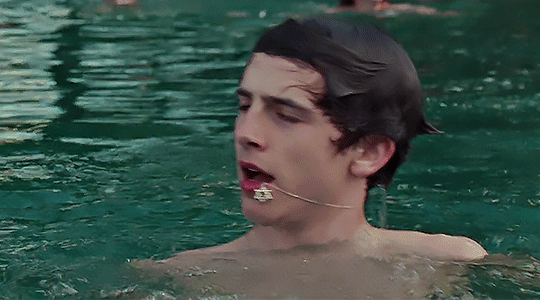
It interlaces their identities, as Elio refers to them in the book as “brothers in the desert.” A reminder of their Jewish ancestors wandering around the desert and eventually coming out of it, reaching the Promised Land. Together. This is also a reminder that in very similar ways, embracing your marginalized identity can give you strength. It can give you roots from which to grow, a community to be a part of, a connection to something greater than yourself. It can give you confidence that some may not accept you, but you are not as lost as it may seem.
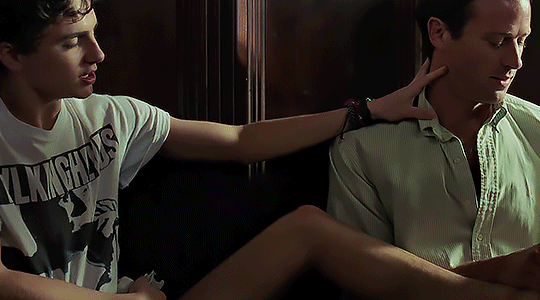
At the end of the day, even if Oliver wasn’t able to choose to live an openly queer life himself, it’s implied that the courage he gave Elio to be openly Jewish, to realize he does have options as a member of a marginalized group, also allowed this young man to eventually be open and honest about his bisexual identity.

In my Brokeback Mountain vs KPTS meta I went into the details of how we know that Kinn and Porsche live in a world in which homophobia exists, but in their personal circle and experiences, it is almost nonexistent. Kinn is definitely not a “queer of discretion.” We don't find out right away, but it’s made clear that he’s not afraid of people finding out he’s gay as he tells a gorgeous woman hitting on him in the bathroom that she’s not his type in ep 102, doesn’t try for a second to hide his boy toy in 103, and then it’s explicitly confirmed by Pete that Kinn’s openly gay in 104. Porsche, who didn’t realize he’s bisexual until he met Kinn, needs a bit more time, though not much more. He recalls they kissed shortly after he discovers Kinn’s gay (nice touch there, showing how that man is Porsche's sexual awakening on several levels) in ep 104, and by the start of 108, he’s ready to tell two meaningful people (his surrogate mother and his best friend) about it. Yes, Jom guessed it first, but Porsche could have denied or lied in reaction, he could have chosen the closet, even temporarily while he was still processing his own newly found identity. He does to a degree, he asks Yok not to tell anyone else because he’s never dated a guy before. But he doesn’t keep his truth hidden from her and Jom.

Yet, I would argue that Porsche’s nervousness over anyone else knowing that he’s dating Kinn qualifies in a sense. He does get embarrassed about his lack of experience in dating a man. He does have a moment of hesitation as they walk out of the bathroom in the cafe during their 108 date and the two girls who walk by glare at them. He even lets go of Kinn’s hand for a moment (and remember that the oath “I’ll never let go of his hand” will become meaningful between them). Then later Porsche gets shy about exchanging kisses in the cafe courtyard as they’re leaving, too. He’s also the one who told Kinn not to share their news to begin with. So for a short while, even if they’re not fully in the closet as queer men, they do keep their relationship stuffed in there, becoming lovers of discretion, in part due to the challenges of homophobia.

Don’t get me wrong, I think they have some obvious fun with the secrecy as well, especially at first, when they enjoy teasing each other sexually in front of everyone else, and without anyone realizing what's going on. But I also believe it takes a certain toll on them. Having to monitor a part of yourself, watch what you can and can’t say, regulate your behavior, limit your freedom, it always comes with a price. For Kinn and Porsche, I think that is most pronounced when Tawan returns. Of course this man isn’t clueless to the fact that they are together even if they’re not open about it, but the fact that they’re hiding it is something he can easily exploit. He can try and get closer to Kinn without Porsche being able to do or say anything about it publicly. He can undermine Porsche’s confidence, get under his skin, without Kinn being able to reassure him in public that he has nothing to be afraid of. By the time Porsche does get some alone time with his boyfriend, instead of having an open, honest talk about it, he’s busy with seduction techniques, because Tawan has already got to him with those mind games. And at the same time, he can get to Kinn, too! Tawan can manipulate the situation to make it seem as if Porsche is a traitor without them being able to talk openly about this. Porsche is not free to say in front of everyone that their love means too much to him to betray what they have, while Kinn's POV might be influenced by the question of, “If you don’t want to be open about us, if you can lie about it, what else can you be deceitful about?”
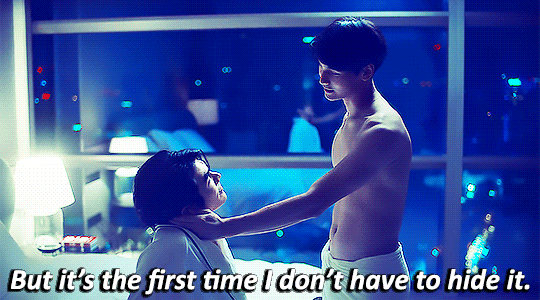
It’s a testament to their bond that despite all this, they manage to come out on the other side with their trust in each other renewed. Maybe even deepened, now that they’ve gone through their first trial of fire, and learned that their love is stronger than they might have previously thought. They started out as lovers of discretion, but after this trial, they get to step into the light, together. "And I will call you by mine"
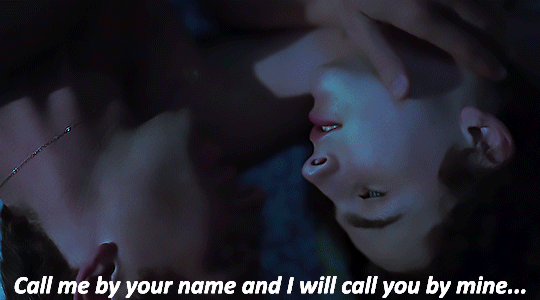
One of my favorite themes in CMBYN is the melding of identities that occurs when two people are not just lovers, they’re also soulmates. A part of one becomes a part of the other. We first witness this when Oliver and Elio finally give in to their physical, intellectual and emotional attraction to each other by having sex. “Call me by your name,” Oliver asks in Elio's bed, which is his for the summer, “and I will call you by mine” (the reversal in identities is also reflected in the upside down shot of this scene). I love that immediate promise of reciprocity. I love that there’s already some level on which he recognizes that they’re so much more alike than some might think.

Calling one by the other’s name also expresses how they’ve changed each other. They’ve made each other braver, happier and more honest. Not just between the two of them. They each allowed the other one to understand himself better and be more honest with his own self. And that changes them. Oliver after Elio is not the same person he was, neither would Elio ever be the same person. He was changed by Oliver, and he was bound to, in order to become himself. To be loved by someone who helps you be a better version of yourself means to be changed, because that better version would never come to be expressed without that person.

So the exchange of names isn’t just a sweet moment between two men who just had sex for the first time. It’s a profound sharing of who they are, tying themselves to each other. It also becomes a part of their love language. Their verbal code for belonging to each other. At a certain point in the book, many years after their affair is over, Oliver is visiting the Perlman parents, and they call Elio, putting the two former lovers on the phone line. Oliver has done what he was expected to do, he married a wife and had kids with her. Elio wonders what’s left between them and what they are to one another, as he knows that what they shared was so powerful, he himself could never forget it. Has Oliver? Elio tests it by speaking his own name into the telephone. He waits all tense for the response. When it’s given, it’s not the one he was hoping for. But towards the end of the book, after a few more years have passed, they meet once more. Elio’s father has passed away. Oliver is divorced. They talk, and as Elio offers to lead them down one of the paths they used to take, Oliver reveals that there’s no need for it. “I’m like you,” he says. “I remember everything.” But Elio doesn’t trust this, not yet. He tests Oliver again by using his own name. If Oliver turns around, if he reciprocates the gesture, then he does remember. Then... then they still belong to each other, and they still have a chance. (no spoilers from me, but if you want to know whether or not soulmates Oliver and Elio do make it, you might wanna check out the sequel, Find Me)

The way I see Kinn and Porsche, they belong to each other in this exact manner. They make each other better, softer, happier and more fulfilled. They had both denied themselves a loving relationship, Kinn over Tawan’s past betrayal and Porsche for the sake of providing for Chay. But once they start one, it becomes evident it’s what they both wanted all along. The contentment that they find in each other is clear in scenes like the date, when Kinn simply gets to be himself, soft and cute, teasing and affectionate, or the one where Porsche just lies on Kinn’s chest, his hair being caressed by his boyfriend, their physical contact comforting and enveloping him.

And since they belong to each other, it is also expressed in a similar exchange of identities, much like Oliver and Elio. When they start their date in 108 by going into the stalls of the cafe’s bathrooms, they are shedding their regular attires, the ones that represent what they’re supposed to be in the eyes of the world, their social roles as mafia boss and his bodyguard. In their place, they put on “civilian” clothes. Except they don’t put on their own, they each wear the other man’s casual outfit from ep 105 (thank you so much to the wonderful @moerusai who helped confirm this for me).

I'm gonna return to Oliver and Elio for a second to mention that after their first night together, after they exchanged names their names, there's another touch of swapping identities, where Oliver is wiping the cum on his chest (most likely Elio's) with his shirt. It's the one he wore on the day of arrival, and Elio asks for it when it's time for Oliver to depart. It's a symbol that even when they'll be separated, they'll still be connected, a part of their identities still swapped. So imagine how much I screamed when Kinn and Porsche exchanged theirs!

This is such an important moment for Kinn and Porsche. They’re setting themselves free in a sense, by allowing themselves to take on something of the other man. They get to be playful together, there is no pretense between them, this isn’t in a space that belongs to just one of them, like Kinn’s bedroom or Porsche’s house, they get to shed something of their identity and take on a piece of the other in a way that lets them be more themselves. Choosing the other man’s outfit is also another way of testifying to how much they like each other, but also that it’s specifically the other one that helps to set them free, to make them a better, happier version of themselves.
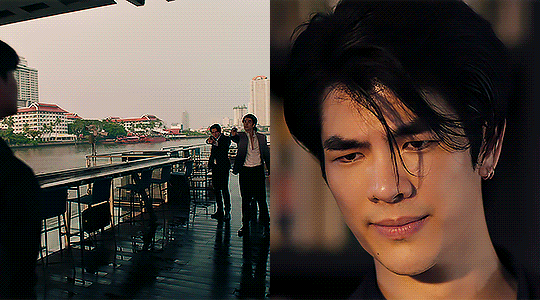
And of course, along the show we'll see them switching between their socially assigned roles, too. Porsche is Kinn’s bodyguard, yet twice along the series, it will be Kinn who steps into danger in order to save Porsche's life from a bullet (eps 103 and 106). Similarly, by the end of the show, in order to be together, Porsche will accept the role of a mafia prince himself, coming to lead the minor family in a role parallel to Kinn's. But this will only happen after the ultimate reversal in positions between them. If in ep 101 we meet cold-blooded killer Kinn, if he had all the power with an entire gang of armed men at his back while he pulled a gun on a very confident and determined Porsche (whose name Kinn originally didn't even know) to extort him, by ep 114 it will be Porsche (confused and lost after everything he has ever known about himself, his family and his life since the accident turned out to be false) who has his gun pointed, while Kinn will be standing there, trying to stop Porsche from becoming a cold-blooded killer, Kinn's hand alone on the right side of the screen conveying his helplessness. They're both stripped naked of all of their defenses and who they used to be, and Kinn's begging for their love and trust to somehow win by using Porsche's name. You can even see the contrast in the way the shots of these stand-offs are framed.

Where identities get intermingled between lovers, names take on a special significance. There is an intimacy in their use, especially as a plea on its own. It's akin to saying, “Can you hear? This is me. I am asking you this and hoping that you'll listen, even when I have no other arguments, simply because of who you are to me and who I am to you.” That’s what Elio does when he uses his own name with Oliver, he is pleading with him to remember what they had, to admit to remembering it, which is to admit to how much it meant to both of them. That’s also what Porsche does when Kinn gives the order to arrest him. He’s no longer arguing facts or his own innocence. He simply pleads with Kinn to remember who they are to each other. If he does, that would be enough to make it all right. While it doesn't work, by the last ep of the show, when it will be Kinn begging Porsche using his name, it finally will.
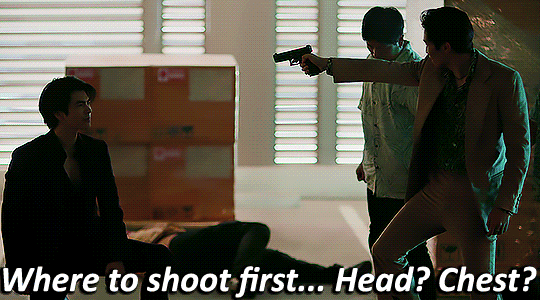
Another way their identities meld together which always gets to me is that in 114, we have another instance showing us that Kinn and Porsche are no longer separate beings, and that one is no longer whole without the other. When Vegas wants to shoot Kinn, something that he confesses he has dreamt about for years, he recognizes that he can’t simply shoot Kinn himself. To hurt him in his most vulnerable spot, Vegas would have to shoot Porsche. In fact, as Vegan points his gun to one organ after another in Kinn’s body and names them, he then points to Porsche’s chest, identifying Porsche’s heart as Kinn's. Their bodies physically are no longer separated. The deep meaning of this observation is later confirmed in the very same ep, when we see Kinn celebrating his and Porsche’s union by preparing a drink that he has named “Kinn’s heart” and presenting it for Porsche to drink.
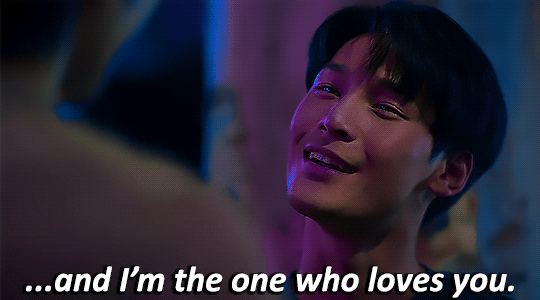
Lastly, we have one of the most important moments in the show in ep 112, when Kinn is asking for another chance and a new start from Porsche underneath the red lanterns (which have traditionally been used in ceremonies of marriage and birth. Yes, both of those feel very appropriate for the significance of this moment, especially as this is happening in the spot where they first met, where their relationship was born). He doesn’t really need to, not when he was just there for Porsche, who was contemplating killing a family man for revenge. Kinn was willing to have his back no matter what choice Porsche made, but he made it more bearable for his boyfriend to spare the man’s life by offering him encouragement and comfort afterwards. Telling Porsche that he did the right thing and Kinn’s proud of him. It’s only after this that Porsche can put the gun away. Would the Kinn who ruled ruthlessly before they met say such a thing? The guy who shot an accountant in ep 101 point blank for a much smaller sin than killing someone’s parents, without even blinking? But Kinn wants them to be sincere with each other, and he knows that starts with asking forgiveness for the things he held back himself. And Porsche accepts his plea for a fresh start through agreeing to play along with Kinn’s re-introduction. If when they first met, Porsche wouldn’t even tell this man his real name, if this scene reminds us that they both lied to and distrusted each other, now it’s a completely different story. Porsche gives his real name, and offers a description of them that says everything about where they are. “I’m the one you love... and I’m the one who loves you.” He presents them as perfect reflections of each other, wording it in a way that would be true if either man said it.
What’s in a peach?
One of my favorite scenes in CMBYN is probably its most controversial one. Yes, the peach scene. In case you’ve only seen the movie, not read the book, I have to start by mentioning that they don’t play out in exactly the same way in both versions. Let me start by saying a few words about the original book version.
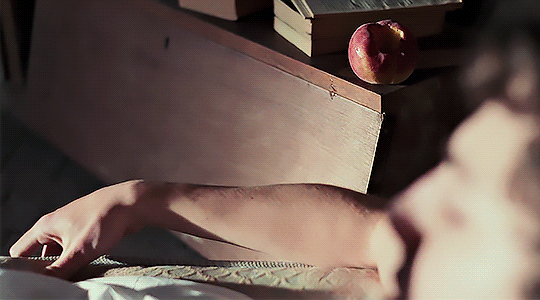
In the book, Elio fantasized about being seen and wanted, he’s thinking of both the girl he had lost his virginity with and Oliver, who he first slept with the night before. So the fantasy is linked to his bisexual awakening. He starts playing it out with a peach he’s been holding, fucking it and tying the act in his mind to a Greek mythology tale he’s making up. It’s about lovers who are kept apart by an unaccepting society, they were turned by the gods into peaches, and this kind of a sexual act is their only possibility of a future reunion, hundreds of years down the line. This tale is a foreshadowing of Elio and Oliver’s eventual separation and the question of whether they would get to reunite. In Elio's mind, it connected this sexual act to shame and to society’s judgment. He also recognizes that fucking a peach is “a crazy thing” once he’s done. With his semen inside the fruit, Elio ends up identifying it with himself, with what he must have looked like the night before, when Oliver came inside him. He becomes ashamed of himself, of his sexuality and of his affair with Oliver, of what society will make of it.

Elio falls asleep and is later awoken when Oliver comes into his room to fulfill the promise made that morning, to give him a blow job. Oliver starts to do exactly that and as he feels the taste left by the peach, it prompts a confession out of Elio. He also ends up asking, “I’m sick, aren’t I?” Oliver reassures him with words that he’s not, then with actions, deciding to eat the peach with the semen still inside. Elio can’t handle that. He tries to stop Oliver, and in a parallel, he first tries words. This only prompts Oliver to confess how much he has wanted Elio this whole time instead of continuing to play it cool. He makes himself vulnerable to make sure the guy he fell for doesn’t feel bad about a passion they both share. So Elio resorts to actions. He physically lunges himself forward. But Oliver catches him and won’t be stopped. He goes ahead and eats the inseminated peach while staring intensely at Elio, making sure he’s watching this. It’s such an impactful moment that Elio describes love making as not going “that far.” At that moment, since the semen is in Oliver’s mouth, Elio says it’s “more his than mine.” It’s another instance when they’re melding into each other. It's a perfect act of love and acceptance which makes even sex pale in comparison. Elio was ashamed and the peach took on the symbolism of everything that he dislikes about himself, everything that he can’t yet accept. And Oliver, by insisting on eating it, is basically telling him, “There’s no part of you that’s too shameful, not even the parts of you that you think are the most disgusting ones, nothing that is too ugly for me to accept and contain.”

Elio gets it. He’s so loved in that moment, so accepted, that it becomes overwhelming and he starts to cry. He recognizes the immeasurable kindness in this act and, in a sense, this is how he reciprocates it, by allowing himself to be vulnerable in front of Oliver, too. In the book, this is where I knew that Oliver and Elio might still go through guilt and confusion, shame and separation, because love is not a magic solution for everything, but they ARE soulmates. They are bonded by this deep understanding and acceptance of each other, as well as a willingness to do what the other one needs even when it means they're making themselves vulnerable. And every deepening of their relationship is built on the foundation of that moment, while their separation happens in spite of it.
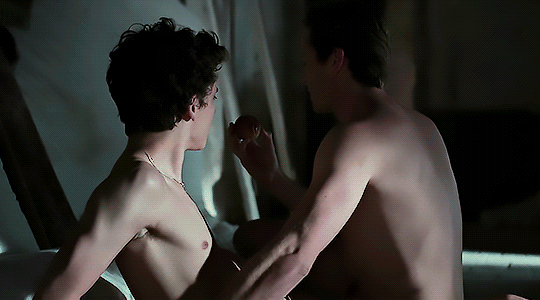
I cannot express enough how much I love the peach scene in the book. I'll forever be sad that the movie dilutes it by having Elio succeed in stopping Oliver from eating the peach. They also added some dialogue that doesn't match the original intention, but even this one change with the peach makes a huge difference IMO, and I also believe it changes the meaning behind Elio's crying, as if it comes from a place of shame, when it's actually the exact opposite. I can only assume they didn’t want to upset viewers too much with this scene's so-called vulgarity. A man almost eating his boyfriend’s seed is better than him actually doing it, right? But really, that’s giving into (in real life!) exactly the kind of societal shame that Elio was feeling. The whole scene becomes... weaker at best.

So when I compare this scene to KPTS, please allow me to do it with the original, more powerful meaning in mind. It was that scene that popped into my head when I first watched 108. Porsche and Kinn are waking up after FINALLY having sex they KNOW they both feel the same, where they are so incredibly joyful about being in sync, and the first thing they do as they wake up... they disgust each other with their morning breaths. This might be played for humor, it’s definitely not as dramatic and intense as the CMBYN scene, but I think it conveys the same idea. Kinn and Porsche are now in a place where they love each other enough to be able to accept even the gross parts the other one has, desire the other person anyway and kiss him passionately (morning breath and all), and find joy together while basking in this complete sense of mutual acceptance and adoration.

It might still not sound like anything too meaningful, but this is going to be a part of the foundation for what will come later. When their reality unravels, when Kinn is forced to admit his family had manipulated Porsche into accepting his job as a bodyguard, when Porsche is at a low point and considers murdering a man at point blank for supposedly having killed his parents, when they discover that their two families are actually linked through murder and betrayal, that they themselves are not exactly who they always believed themselves to be, Kinn and Porsche will also find that despite everything, their love for each other allows them to contain all of these ugly realities and continue to trust each other, continue to build a life together. Like Oliver and Elio, they’re soulmates, too.

Here, I might add a little note that connects this part of the meta with the previous one. When Kinn and Porsche exchange clothes (and thus, identities) in 108, they choose to wear the clothes they did in 105. That was one of their more painful moments. They’re no longer deluding themselves that they don’t want the other guy, but they’re still hurting each other. Wearing those clothes, out of all possible outfits, signifies an awareness of the other man’s ability to wound them, an awareness of the ugly parts, of the pain that is entailed in every relationship, of the vulnerability they’re bringing upon themselves by abandoning the simple sex life they had before, and choosing to go on a date together despite and together with all of that. They’re containing each other with the parts of the other man capable of hurting them, and still choose to love him. Not out of blindness, they love each other with eyes wide open, they accept the worse parts of the other one, and in doing so, they allow him and themselves to be their best, happiest, most fulfilled version.
To love as a choice

Oliver and Elio are soulmates because at a very specific moment in time, they choose to love each other, with the worst parts of themselves included. They end up separated after their summer together, but before that, they choose each other in the most profound way. Which means that even once they’re separated, even though they hurt, even though they remember each other with longing, they wouldn’t erase their love even if they could. That's what the last shot of the movie is about, feeling the pain fully and still not regretting anything, knowing that it was worth it.
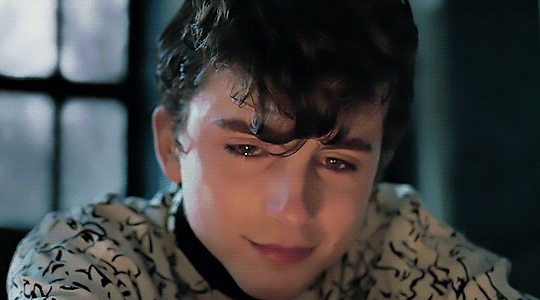
Do Kinn and Porsche feel the same? I believe that like Oliver and Elio, they very much choose each other. Kinn and Porsche are not together only because they have to, it's because they want to. They might have had a moment where they tried to move on from each other and couldn't, but it’s not the end of their tale. In 105, they try to get past what has started to develop between them by having sex with someone else, with a person who represents their usual type up until then (for Porsche it’s a woman, for Kinn it’s an easy to control boy toy) only to discover that they can’t. There’s something about the other man that makes it evident that the kind of people they used to hook up with cannot satisfy Kinn and Porsche's needs anymore. But that doesn’t mean that they run straight back to each other. Their next interaction will actually involve a loaded gun being held between them, a fitting metaphor for how they still don’t trust each other and they’re each still incredibly upset with the other guy.

It takes Kinn choosing to come after Porsche, making an effort to be less demanding and entitled, as well as making himself vulnerable in 106 for that to change. It also takes Porsche choosing to listen to Kinn in 105 instead of kicking him out, making himself vulnerable by angrily pointing out that Kinn never cared about him (exposing the fact that Porsche wanted him to) and being willing to look and really see who Kinn is behind his mafia prince mask. Which is why by the end of that ep, they choose each other. Kinn chooses to let Porsche go, give him his freedom and a chance at his dream and a normal life. Porsche chooses to return to Kinn despite being set free from the mafia life he despises. Porsche chooses to sacrifice his hand for Kinn (let’s not forget that without a hand, he can’t know if he’d be able to provide for himself and for Chay, maybe his most important goal in life, if he even survives amputating himself out in nature, away from any medical help), while Kinn chooses to take a bullet for him. After this ep, no matter what happens to them, no matter how bad things get, I think they know that this love and devotion is the best thing that has happened to them and they could never want to let go of each other, they would always hold each other’s hand, they would love the other man with eyes wide open and out of their own free will. They go through their own pain and suffering, the ending of the show implies that with Korn still scheming, there will be more in store for them in the future, but it's also clear that just like Oliver and Elio, Kinn and Porsche would never regret choosing and loving each other. They too know that it's worth it. Like I said... Soulmates.
(Thank you for reading! For more of my Kinnporsche/Mileapo posts, click here. For all of my Kinnporsche meta on AO3, click here)
#mkp#mile phakphum#mile phakphum romsaithong#phakphum romsaithong#apo nattawin#apo nattawin wattanagitiphat#nattawin wattanagitiphat#kinnporsche#kinnporsche cast#kinnporsche the cast#kpts cast#kpts the cast#kinnporschedaily#mileapodaily#kinnporche the series#kpts#kinnporsche meta#kpts meta#kinnporsche the series meta
48 notes
·
View notes
Text
Marahuyo Project Eps 5 & 6 Stray Thoughts
Last time, Lorie decided to befriend King and Venice, and joined their club. When someone spray painted the mural of Ino’s ancestor, the other kids and dean blamed King, but Lorie stepped forward to claim she did it as well. The queer club was punished with community service to clean the beach, and the three bonded over their time together. We learned that Lorie’s queer awakening is complicated by her anger at her father’s infidelity (and men as a whole as a result). We learned about a young person who died on the beach, revealed to be a close friend of Venice’s and Archie named Christina. Archie refuses to use Christina’s name because he believes it was her queerness that got her killed, and it’s why he’s trying to protect Venice by demanding she withdraw from her expression of herself. We also learned that Ino’s dad likely left their family for a queer relationship, Ino is admittedly falling for King, and his mom told him directly to not be gay. Also, King’s mom cut his hair in his sleep and I am still pissed about it.
Episode 5: Hunyango
I do love the bits of history and mythology we get at the beginning of each episode. I liked how this one highlighted the journeys of many of the characters.
Few things more powerful than a bunch of out kids enjoying an early morning strut. Poor Lorena, though. She wasn’t ready for this divide between her and Lili.
Oh good. It was just Ino with a torch. I clearly play too much d20 fantasy.
The kids are right. Naming things is hard.
Growing up, my dad thought I might become a priest.
I respect this line that Venice is walking in the conversation with Archie to reach through his walls.
Oh wow. Archie is so stressed that he’s scratched up the whole back of his neck. That’s uncomfortable.
Aw, Venice. I’m enjoying the brainstorming session. It’s good to model what planning communication with people not predisposed to listen to you. I also love that they decided to build their plan around the local context of Marahuyo and then immediately transitioned to Lorie legitimately doing research about her home.
Lorie, your friend looks worried. Can you not look at her lips like you wanna kiss her right now?
Whoa, what’s going on with Lili? Are we going beyond the Q in the acronym?
Ino is also correct. You cannot frame a presentation around a local context without directly engaging with the locals who are the context.
🎶 Flashback! Who’s that?? 🎶
Oh, Ino, what have you been through that you thought to ask before hugging King?
I’m very curious about the statue they uncovered on the beach.
Hold on, did Venice add Christina’s name to hers as a way to honor her? I need to lay down for a bit.
Ah, so we’re definitely going into rare presentation with Lili. I am seated (once I get off the floor from the last bullet).
Oh no. Please stop showing me Archie’s neck. It’s a good visual to show how these internalized pressures and traumas express in physical ways, but oof.
Episode 6: Sirena
Super amped about these kids taking the research component seriously within their specific connections. Lorie got info that her dad has access to as the mayor. Venice got info from the church through Archie. King got equipment so they can conduct interviews. Now they’re all gathered and reviewing the information they have.
“Joining us as an ally.” Wow, so many points to this show for reminding people that sometimes an ally is someone who isn’t ready to or can’t come out. In any case, they are with us in the movement.
Poor Venice. She just doesn’t know things.
Hold on…I think I recognize the Lola Puri actress. I will look her up when we get to the credits.
Good job on this show for priming people with the earlier lesson about babaylans for this reveal here.
Boys, are we doing a gay pinkie touch during the critical history lesson?
Hey, this is really good. They have an oral history now connecting a prized tradition to the yearnings of a respected ancestor for another man who turned on him in a cruel way. Unfortunately, the villain of this story happens to be one of Ino’s ancestors. Sad, but unsurprising, that a homophobe gained prominence for outing and robbing a queer man.
I’m really touched by how all of the kids had such an emotional reaction to the story and how it reflected some of their own feelings. I deeply appreciate this show for letting me see others experience how queer history feels for me.
Goddamit, Marco, I was enjoying a complicated, difficult moment. Can you fuck off?
Thank you, Lili, for destroying this man. Make sure to hydrate.
Who is this man at the dinner table in Ino’s house? It’s probably not the dad, right?
And there it is again: Venice telling Archie that courage isn’t built around coming out. He still helped them where it counted.
I’m so sick of this priest.
I do love Juvy. She’s usually so correct and King actually listens to her.
“Who are you?” “Incorrect answer! I already know your name.”
On the real. I’m so proud of Ino. The first person you have to say it to is yourself.
Oh noooo. This is probably actually Ino’s dad. This scene is about to get even uglier.
Mmmm. I don’t like Lili giving up her shorts and then immediately going to a scene where she has to get rough with Marco.
Wow, this is horrible. What a way to end this episode.
I did recognize the Lola actress! That's Angie Castrence! I knew it was Gavreel’s homophobic aunt from Gameboys 2! This was a great 6th episode with very clear ideas and goals. This episode focused completely on coming out, who it’s for, and whether it’s necessary. I like that we had three characters all scared to come out, but it’s eating away at all of them. Archie is literally tearing his neck apart in anxiety. Ino is say gay and in love that it’s leaking out of him, to the point that he was forced to confront his own mom. Lili has been outed by Marco. I love that all of our out characters reassured our closeted characters that they didn’t need to come out. Can’t believe I’ve got two shows in contention for show of the year right now.
16 notes
·
View notes
Note
i want to thank you for your post from a few months ago about abandoning the idea that health is good. it's helped me process and unpack just how much the health framework has damaged me (and everyone; you could get multiple phds exploring how the concept of health categorizes and controls bodies!). and those ideas have extended beyond my personal life to my academic and professional writing and my interactions with loved ones - they've reached and impacted a lot of people.
i was a disabled child in a family of career athletes; the health paradigm was deeply engrained at an early age. now that i'm finally shaking those teachings, i've gotten a lot out of reanalyzing ideas i've always framed through a health lens. if it doesn't matter if i "eat healthily," since that's a meaningless concept, then how and why do i choose what i eat? why do i want to stretch regularly, if not because it's healthy and my doctors said it will improve my disability? how does my relationship with substance use change when health is taken out of the equation?
in these questions, i often find there's deeper and more satisfying reasons for my feelings and actions. this process reminds me of my experience with transness, in a way. reconsidering the concepts and assumptions underpinning a framework, deciding the whole framework is useless to you, and exploring what lies beyond it. thank you for opening such a freeing and fascinating door :-)
oh, woah, this absolutely made me cry, i truly can’t express how meaningful this is for me. (as you might know from following my blog lol) i’m homebound & only see two people in person unless i’m at the doctor, so this feeling of connection to other folks in my community is so deeply valuable, i really can’t thank you enough 💓💓
i definitely relate to the sense of rejecting health leading to a changed perspective on, like, everything in my life + prompting more intentional ways of engaging with my choices, routines, etc. following that theme of community, lineage, & ideas that ripple out, i’d love to take the time to mention just a few of the scholars, ancestors, comrades, & friends who have been life-changing for me in this area!
while there is a lot of transformative & vital work within disability studies, there’s still a lot of structural barriers against sick people’s contributions to formal theory + a lot of direct & indirect reinforcement of health as a good thing in the field. so i’ve found in many cases more resonant work in trans studies, mad studies, & postcolonial studies, by people affirming the pathology of their own identities & positions. just a few favorites of mine from within, across, & outside of these fields, in no particular order:
Sandoval-Sánchez, A. 2005. Politicizing abjection: in the manner of a prologue for the articulation of AIDS Latino queer identities. American Literary History. 17(3), pp.542-549.
Fritsch, K. 2013. On the negative possibility of suffering: Adorno, feminist philosophy, and the transfigured crip to come. Disability Studies Quarterly. 33(4).
Barounis, C. 2013. “Why so serious?” Cripping camp performance in Christopher Nolan’s The Dark Knight. Journal of Literary and Cultural Disability Studies. 7(3), pp.305-320.
Abrams, T. and Adkins, B. 2020. Tragic affirmation: disability beyond optimism and pessimism. Journal of Medical Humanities.
Stryker, S. 1994. My words to Victor Frankenstein above the village of Chamounix: performing transgender rage. GLQ: A Journal of Gay and Lesbian Studies. 1(3), pp.237-254.
Sexton, J. 2011. The social life of social death: on Afro-pessimism and black optimism. InTensions Journal. (5).
these were all immensely profound to me, but this last work, following Fanon, was such a complete & total frame shift for me that i feel the need to include some of it here (emphasis added):
This is precisely what Gordon argues is the value and insight of Fanon: he fully accepts the definition of himself as pathological as it is imposed by a world that knows itself through that imposition, rather than remaining in a reactive stance that insists on the (temporal, moral, etc.) heterogeneity between a self and an imago originating in culture. Though it may appear counterintuitive, or rather because it is counterintuitive, this acceptance or affirmation is active; it is a willing or willingness, in other words, to pay whatever social costs accrue to being black, to inhabiting blackness, to living a black social life under the shadow of social death.
This is not an accommodation to the dictates of the antiblack world. The affirmation of blackness, which is to say an affirmation of pathological being, is a refusal to distance oneself from blackness in a valorization of minor differences that bring one closer to health, to life, or to sociality.
[…] In a world structured by the twin axioms of white superiority and black inferiority, of white existence and black nonexistence, a world structured by a negative categorical imperative— “above all, don’t be black” (Gordon 1997: 63)—in this world, the zero degree of transformation is the turn toward blackness, a turn toward the shame, as it were, that “resides in the idea that ‘I am thought of as less than human’” (Nyong’o 2002: 389). In this we might create a transvaluation of pathology itself, something like an embrace of pathology without pathos.
To speak of black social life and black social death, black social life against black social death, black social life as black social death, black social life in black social death—all of this is to find oneself in the midst of an argument that is also a profound agreement, an agreement that takes shape in (between) meconnaissance and (dis)belief. Black optimism is not the negation of the negation that is afro-pessimism, just as black social life does not negate black social death by inhabiting it and vitalizing it. A living death is as much a death as it is a living.
if you want a pdf of any of these & are unable to find one feel free to hmu (although they will likely come with my annotations lol). this was a major topic of my master’s thesis for my disability studies degree (which was actually about disabled trans people, so i love that you connected this process of rejecting normality to transness in your own experience – i relate to that a lot) & i’m also happy to share that research with anyone who’s interested :)
i also have relevant thoughts & reblogs in my “stay sick” tag here (which i’ll add to this post) & my “embracing abjection” tag here + more broadly on my main.
& just a few of the many folks whose work + lives have shaped mine: @kelpforestdwellers @heavyweightheart @librarycards @crutchbutch @gatheringbones
i would also (always) absolutely love to hear more about your thoughts + writing if you would like to share! thank you again for taking the time to share this with me, i appreciate it more than i can say 💓💓
#asks#stay sick#embracing abjection#afropessimism#disability studies#happy tag#ok to reblog <3#stained glass mirrors
48 notes
·
View notes
Text
I've spent the last few days processing election results with my kin, reaching out or making plans to call with the people I love. I've tried not to doom scroll, not because of the many many takes (good and bad) about the election, but because I have never seen so many posts begging LGBTQ+ folks not to kill themselves. Let me be clear: These post are important, they are a reminder that all hope is not lost. We need you here, I need you here.
These posts though, have made clear to me the depths of despair the election results have caused in my loved ones. So I want to share what has given me hope:
I'm thankful to be in a place where survival is no longer a question. When I went back to school, I remember telling my mom that I was going to finish undergrad. She told me it was okay to come back home if I needed. I love her for the reassurance, but I knew, even if I could not articulate it at the time, that finishing undergrad would keep me alive. "I'm graduating with an undergrad degree even if it kills me" because I knew I was supposed to want to live, but without a goal to keep me living I didn't think it was possible.
Now, five years later, I'm six months past graduation and I don't need a long term goal to keep living. I want to live, I love living. I love this amorphous Queer new life I'm creating for myself with my kin. Survival is no longer a question, it's a given. I have survived, and I will keep on surviving. And so will this world we live in.
In four years, we will have survived a second Trump presidency. In two years, we will have survived long enough to vote in midterms and take much of his power from him. In one year we will be preparing to gather with family again, even if the gathering is fraught or against our wishes. Tomorrow, I will wake up having survived the night. And you will be there with me.
Survival is not the question.
We will survive.
How we survive? Now that's the fun part. The question that fuels my work. What new ways can we conjure to keep each other safe? Who of our ancestors can we look back at to find forgotten strategies of survival that we can revive and rework for our current struggle? Where will our bodies meet? Will there be joy or pain? How will we survive together?
Only time will tell, but the unknowing gives me hope.
I am not in despair because no matter the results of this election I knew there was work ahead of us. The tenor of the work, the insecurity in the air would always have a different scent. But building community, mutual aid, and grassroots organization was always going to be my next step.
I will survive the next four years, and you will survive them with me. Because we need each other: We need each others sorrow, our shared grief, the pain and loss that connects our atoms. I need your ambivalence, your struggle, you failures. We need to feel the shape of our shared joy between our fingers. We need pleasure and laughter and I need to see you here with me in four years when we have survived into the future we have claimed for ourselves.
3 notes
·
View notes
Text
So I think I finally realized what my bias against ancestor work was (aside from my internalized (and sometimes externalized) distaste for my extended family, and even my parents and one of my sisters.
I realized that I didn't really have anyone to reach out to. There was no one on my family tree that I would really consider trying to work with, spiritually. The only person I would maybe consider is my Papa, but I believe he is in Heaven because that was where he was supposed to go. Heaven is what he believed in, and Heaven is where he is.
[aside: I do not believe in his Heaven, but that doesn't negate the fact that's where he is. I'm not explaining my UPG in this post, I may in a later post]
But I would reach out to all my queer siblings who left this earth too soon. I would reach out to authors whose words I admired in a different time. As a flaming queer and writer, these are my ancestors. Those who lived their lives before mine, who loved the same way I do, who fucked with gender the same way I do, who wrote words that resonate still, like I pray mine will.
Ancestors don't have to be blood relatives.
#y'all I can't even begin to tell you what a revelation this was#I've been unlearning so much internalized bullshit lately and this was another piece of the puzzle#anywaysssss#wander talks#wander talks shop#new tag alert->#not witchcraft not paganism but a secret third thing#wander is so fucking high y'all
5 notes
·
View notes